#than to refer to the actual identity he has as a black gay man
Text
Positioning Louis as the "Edwardian wife who becomes trapped by her husband" in a literal sense does no justice to analyzing his actual place and role as a Black man in his society and in his relationship with Lestat. Any interpretation or analysis you do of him when it comes to their relationship cannot be stripped of the racial aspect because it's constantly there. Texts analyzing Edwardian wives (and particularly ones this fandom loves to bring up) typically were white and the dissection of their place in societal rules are always viewed from the aspect of gender that is within these texts only allowed to white women, but never to Black men or even Black women. And gender and race become inseparable when you discuss the latter, no matter how people may view it.
This is why I can't take this approach to analyzing Louis' story seriously because if you don't consider the racial aspect in his relationship even to himself and his sexuality, what's the point? You're still centering the standards that were more placed upon white male/female couples than you're willing to look into the unique structure of Black families, religion, their view of homosexuality and how that sooner heavily influences Louis than the family's "need" for him to be sold off to an Edwardian husband. Even in Louis' own story, him and Claudia being Black is more centered on than any demeaning "housewife" comment he tries to go against from Claudia's perspective. She makes that comment once, whereas we have at least two episodes from Louis' perspective that have very blatant hints and showings of the racism he still suffers from under the Jim Crow era and how it affects his self-worth as well as his relationship with Lestat who doesn't seem to take into consideration how any of the blatant racial aggressions and objections still affect Louis and what he considers to be important to achieve in his own life.
Then there's also the pointed topic of Louis' position as a Black man who is a pimp to the Black women he has as sex workers, as well as how his position as a Black father affects Claudia, another Black girl. If you insist on Louis being centered as this "Edwardian white wife" who is confined by his implicit gender in his marriage, where does that leave Claudia and the blatant misogyny and disrespect she gets from both him and Lestat? Lestat who is her white father abuses her. Positioning Louis within the strict confines of "being her mother" doesn't do her any favors because he didn't hesitate to choke her when he was deeply emotionally distressed, nor does it make him look any better when he's fine with chopping up her diaries and then delivering them on a silver platter so that Daniel, another white man, can read and dissect. Even if he does this under the sole pretense of "doing right by her", how does it in any way help when he also can't face up to his failures towards her?
#interview with the vampire#claudia#louis de pointe du lac#i just feel like all these needless 'Lestat is the patriarchy' discussions; even when done in order to shield Louis#do him and Claudia no favors because y'all keep centering these weird strictly white standards in your interpretations#'Louis is an Edwardian wife' Louis is a Black man who was turned in 1910s Louisiana#the structural confines Edwardian wives were given really aren't the same when you take into consideration the racial segregation#of Louis' time; and I feel like the specific issues that Black men then faced when it came to 'proving' their worth when it comes to gender#are then just sidelined and forgotten as if those aren't the standards Louis grew up with#if you want to discuss Louis' placement in his relationship with Lestat it's kind of really heavy-handed even on the show#that he's a black man and that that heavily affects him foremostly in this relationship#also I'm so confused over this insane idea that Lestat is somehow the patriarchy while Louis is a woman and y'all say this unprompted#without considering how it looks when you call a gay black man a woman and a white bisexual man a guy#i feel like you can evade bad stereotypes of painting black men as overaggressive without veering off into the whole other side#while still sounding vaguely backhanded#and it doesn't make it any less weird when I see other non-black/white fans insist on this interpretation#it just comes off as y'all sooner being able to connect to Louis if you see him in a role typically embodied by white women#than to refer to the actual identity he has as a black gay man
209 notes
·
View notes
Text
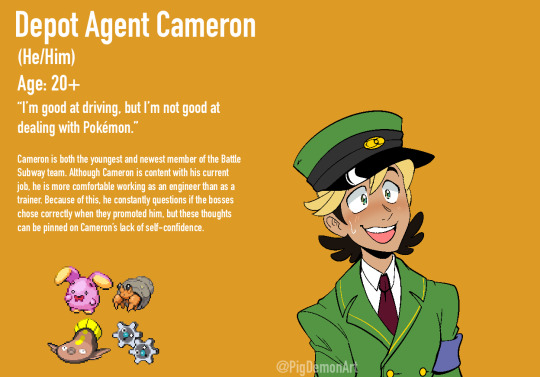


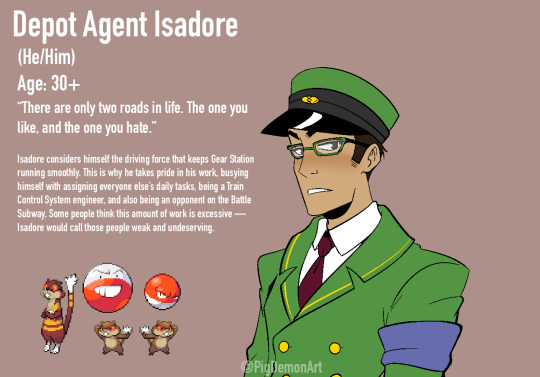
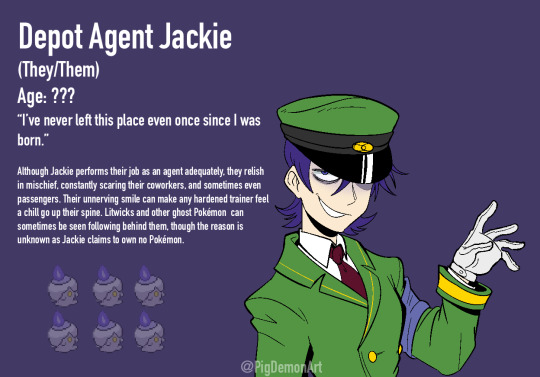

Battle Subway Depot Agents (by pig-demon)
When I made designs for these guys last year I didn’t really think they needed colored references/master post, but since then I’ve drawn them a lot! Also people have added them to their fanfics and drawn fanart! So I figured it was time I made a post for easy ref. :]
These designs are obviously free to use, just give credit (and link me your work if you're comfortable, because it makes me happy to see!) All I request is to stay respectful to their pronouns and skin colors, ya knooow… 👍
note: The pokemon on their cards are all companions, not the ones they use on the Battle Subway. Except Jackie...the litwicks are just there to fill space/give them company.
More info under cut:
Edit: Important disclaimer:
These are again my designs/interpretations for the agents. Please don’t treat them as canon or as the only, quintessential designs for these literal background npcs. Many people have done takes on them before and after me, even back in 2010. It feels silly to ask, but due to past experience, I ask that you please DONT hunt down anyone that does a different take on the depot agents!! 👍
Tags:
I'm gonna start tagging them individually, but for now all Depot Agent comics and art on this blog are tagged under Depot Agents.
Height chart:
I’m not too strict about heights, so I don’t really care about actual measurements. Here’s an approximation of what I tend to visualize though:
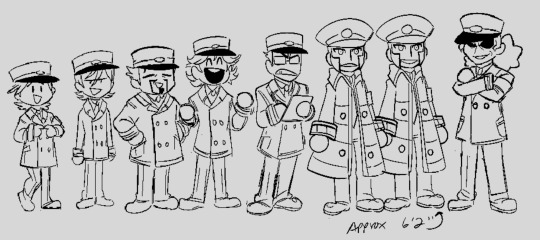
Sexualities/Gender Identities:
I don't have official labels for each and every agent because I like keeping things fluid for characters to develop these traits on their own. However, as a queer person, I enjoy designing characters who are also queer, therefore I can safely say none of these characters are straight.
The ones who are set in stone are Ramses (gay man), Cloud (lesbian woman,) Jackie (non-binary.)
Furze uses he/they pronouns but their gender is undetermined.
I also welcome anyone giving the agents a different gender identity to suit them (as long as it's done respectfully.)
Notes about each agent...
Cameron:
- Cameron dyes parts of his hair blonde and keeps other parts in black. This is because he is a big fan of Elesa and her fashion choices.
- Though there have been a few occasions to meet his idol, he is always way too nervous to approach her, feeling deep down that he'll mess up somehow.
- He practices modeling poses in secret. He loves flourishes and flare, but is simply too insecure to put it on display.
- Of his coworkers, he gets along the best with Furze. He's the easiest to talk to because Furze will do most of the talking.
- Cameron is easily intimidated — even mean Pokémon can make him nervous. Though, his two worst fears are being left in a room alone with Jackie, and being left alone in a room with Isadore.
- He takes advantage of his height to sometimes hide behind some of his coworkers.
- Cameron is much better at Pokémon battles than he gives himself credit for. Emmet and Ingo were pleasantly surprised by this, since Cameron was promoted to fit a temporary role on the Battle Subway. They happily made him a permanent member when he proved himself capable.
- His Dwebble (Pebby) is secretly very strong, and rushes to protect Cameron when it can. Cam sometimes thinks Pebby helps him feel more confident in himself too.
- If he stumbled into any of his coworkers outside of work, he would simply explode of embarrassment.
- He is the youngest child and only son of his family. He lives in his own apartment in Nimbasa.
Cloud:
- Cloud (like Ramses) knew the twins when they were very young.
- She used to be an ace trainer in her youth, even going so far to compete in the Pokémon league. Winning and becoming the champ was the most important part of her journey, but something happened along the way that changed that outlook.
- It seems with age, her competitiveness has mellowed out. However, she maintains an intense energy when battling.
- Her favorite types are Psychic and Flying types. Swoobat (Sweetie) is her ace.
- Her favorite hobby is baking, and she often bakes sweets for the crew. She knows all their favorite flavors by now!
- She prioritizes keeping a friendly relationship with all her coworkers and thinks of them fondly. She considers Ramses family after all the years of working together!
- She is a big fan of Brycen's movies and can recite the lines.
- She lives with her wife in Anville.
- Cloud loves doing maintenance work both at home and in Gear Station. She enjoys bringing her own tools and industrial flashlight.
Furze:
- Furze only has one volume setting (mid loud,) but he finds himself feeling right at home when talking to either one of the twins.
- Furze has ADHD, and this is reflected in some of his habits, most visibly is his fidgeting when sitting still for too long.
- He rides a bike to work every day. When he is late, Cloud clocks in for him so he doesn't get in trouble.
- This is a kind of a guy that sits crouched gargoyle style on chairs. Only outside of work, of course. Bad posture could get him in trouble.
- While working on the Battle Subway, there will be times Furze feels sorry for his opponents and offers to quietly let them pass anyways. This...has also gotten him in trouble. :[
- He went to the same elementary school as Isadore in Castelia. Though Isadore seems to have forgotten their short-lived acquaintance, Furze has not. This is part of the reason Furze claims they are in fact good friends!!!
- Furze is the middle child of a big family. He lives with his mom and takes care of her, along with his many Darumakas and Darmanitan. All of his Pokemon have famous trains names.
- He collects model trains. Naturally.
Isadore
- Isadore had plans to become the station master the moment he was hired as a depot agent, but alas... (sad trumpet sound.)
- As a youth, he was more interested in science and engineering over Pokemon battles. He enjoys the strategizing aspect, at most. Not so much the competitiveness.
- In addition, his Pokemon are all rescues and not used for battling. He's had his Watchog (Winston) since he was in his late teens.
- His Electrode (Gregor) and Voltorb (Leonard) were rescued from the likes of Team Plasma.
- Isadore admits he understands Pokemon better than humans. This has been apparent his whole life.
- In spite of acting like a sitcom villain, Isadore cares about the management of Gear Station and the safety of the passengers to an incredible degree. He sees it as a personal life goal to assist in the management of Gear Station, as well as the success of the Battle Subway.
- Though it pained him to become a subordinate to the twins, he begrudgingly accepts it for the greater good.
- His almost militant efficiency certainly made up for his years of antagonizing the twins before they became the bosses. Ingo and Emmet understand this better than anyone.
- Isadore keeps tabs on all of the staff members. So he very well knows all their birthdays and makes it a point to celebrate it. This is by no means a -happy- or -festive- event. It's just customary.
- Like Furze, he was originally from Castelia, but now resides in Nimbasa. Isadore's only family is his mom and she lives in his childhood home with their Stoutland.
- Isadore would have probably been voiced by every glasses guy ever J. Michael Tatum had he not already been cast as dear Emmet lmao
Jackie
- Jackie is a mystery and they like keeping it that way. When they talk, it's practically impossible to determine what is a lie or truth, especially if the subject is themselves or their background.
- They love scaring Cameron the most and will ask to be paired with him whenever possible. They claim Cameron is their "favorite coworker," while Isadore is the least favorite.
- It's plain to see why -- Jackie is the only one that doesn't passively tolerate Isadore's tirades.
- Though my comics sometimes may allude to Jackie being a ghost/supernatural, this is not confirmed nor canon. I just personally enjoy toying with the concept. : ) That being said...
- Item #: SCP 7453
- Object Class: Euclid
- Special Containment Procedures: The ████ ██████ is ██████ within ████-██████.
- Ingo and Emmet choose to not question anything about Jackie, since it's clear they're one of the more efficient workers. However it can be a safety concern...
- Cloud and Ramses have worked with Jackie for a long time, though they've forgotten somehow. They believe Jackie is a new hire since they appear to be young.
- Anyone trying to make sense of Jackie's employee records simply can't bring themselves to any conclusions. It's better to ignore the inconsistencies.
- Jackie has never been seen to leave Gear Station. Jackie has never been seen in anything but their uniform. Jackie has never been confirmed to eat, drink or blink. Jackie knows your secrets. Jackie thinks it's... amusing.
Ramses
- Ramses sometimes misses having a full head of hair, but he thinks his signs of age make him look distinguished. (he is correct.)
- Ramses is sort of the "mom friend," making sure everyone's concerns are heard, as well as trying to keep the peace whenever a conflict might arise.
- If another coworker is feeling low, Ramses will try to cheer them up with a lighthearted joke or offer advice if they'd like it.
- When the twins were promoted to bosses of the Battle Subway, Ramses cried because he felt so proud.
- In most circumstances, he is a very simple and logical man. He is quick to find solutions and tries not to fret over the little stuff. It's not good for his heart after all.
- His ace is his Pikachu (Musa,) though the mouse is more of a lap pet now. At home, he also has an Audino (Sara) and a Manectric (Nubi) who keep Ramses' husband company. His Klinklang (Moli) is the only one of his personal pokemon that accompany him to work nowadays.
- Ramses considers Cloud family. They are best friends and love having family gatherings outside of work. They also gossip a lot, and don't mind when Jackie decides to join.
- Ramses jokes about looking forward to retirement, but really doesn't want to leave until he is physically incapable of working anymore. Gear Station is like a second home to him.
In-Game Quotes
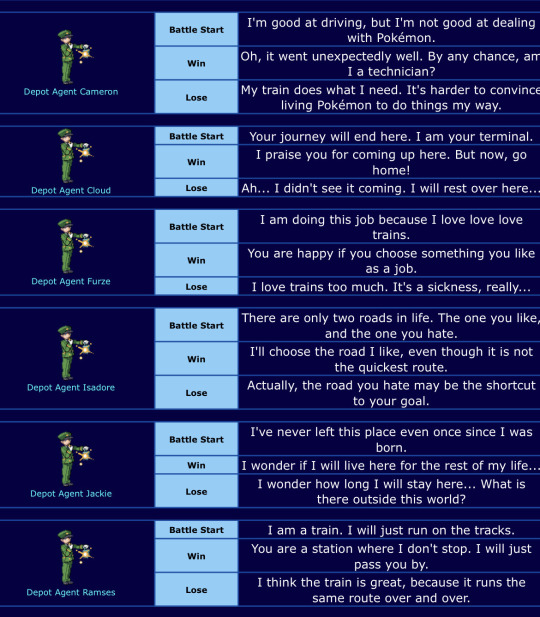
The most important reference of all are their in-game quotes, of course, so I'm adding it to the post. A lot of their personality traits can be extracted and interpreted from these few lines. And I personally love that about Pokemon NPCs -- there's a lot of room to explore and play with.
Some appear very obvious. Cameron practically announces that he isn't ready for the battle that's about to ensue and seems genuinely surprised to win. Furze comes out the gate talking about the subject they actually care about, which is their job and their love for trains. The two of them are very easy to understand.
Now, Ramses lines allude to a gentle and simple personality. He views himself with humility, and maybe even with a bit of humor comparing himself to a train and to his opponent to a station. If he loses he shows no signs of disappointment, he just accepts defeat with one last honest quip. It s also amusing to see the Depot Agents all use train metaphors to describe themselves since it falls in line with how Ingo and Emmet talk.
In comparison, Cloud does the same thing calling herself the terminal instead. Immediately, she is way more daring, though still keeping a sense of professionalism. To me, it's obvious she is competitive as she even admits she was expecting to win ("Ah...I didn't see it coming.")
Jackie's lines are fun since it's up to interpretation if they are being literal or lying. It's almost like they are more interested in confusing/creeping out their opponent than actually beating them. To me, it gives off a mischievous vibe.
Isadore's opener "There are only two roads in life." is a curious one because it almost feels like he is trying to be philosophical. Definitely a guy who views himself as an intellectual, regardless if that’s true or not. I like to think it's a saying he really believes in, and it applies to his life. The road he likes (long route) vs the road he hates (shortcut) -- fighting tooth and nail to become boss vs biting his tongue and accepting Ingo and Emmet as the Subway Masters.
Those are just my thoughts on how I write these characters. Please have fun playing with these lines too!
#depot agents#depot agents master post#my art#submas#submas adjacent ahaha#will probably edit as time goes on but who knows really#if you spot any typos no you dont kiss kiss#cameron#cloud#furze#isadore#jackie#ramses
2K notes
·
View notes
Text
Mother is God, In The Eyes of a Child
This has got to be my farthest-fetched theory, and its more of a collection of observations that weave together than an actual theory. However...there's something distinctly weird about all this.
It started here:
Max steps on spider egg sacs in Vecna's mind lair, and the babies spill out.
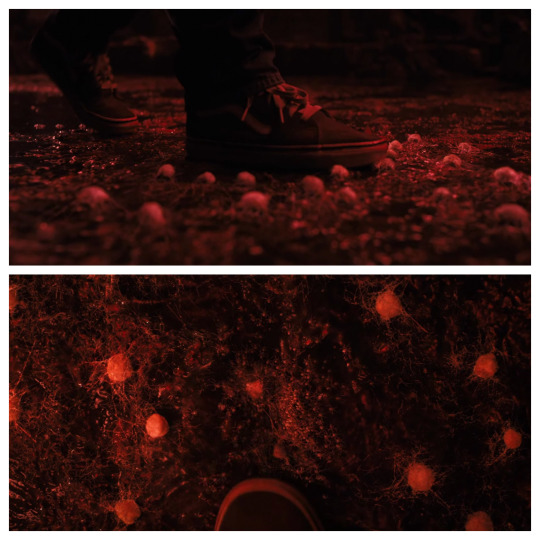
"If there's a spider, you're never gonna find it 'till it lays eggs and the babies spill out"
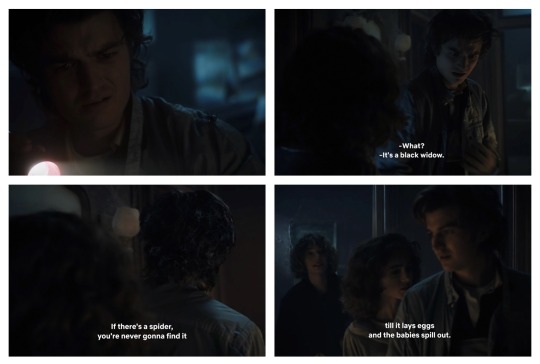
Then Vecna killing Patrick while looking distinctly like a spider on a web, a direct comparison to those black widows.
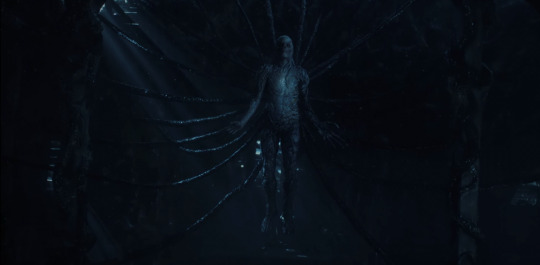
And I talked in the discord chat talking with Em for a while like. They. They wouldn't. Right?
And I've been sitting here thinking about the last time I said "they wouldn't...right?" So here we go.
"Of course you have a mother. You couldn't really have been born without one."

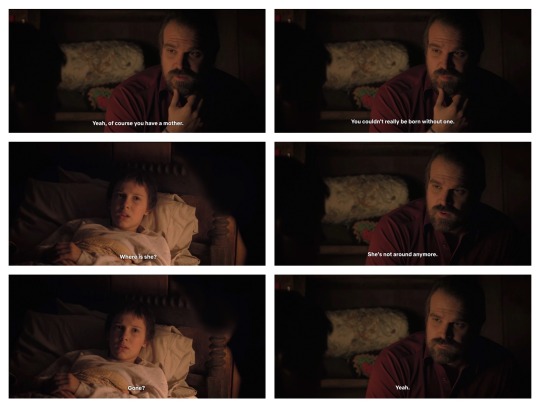
But Mama is dead...
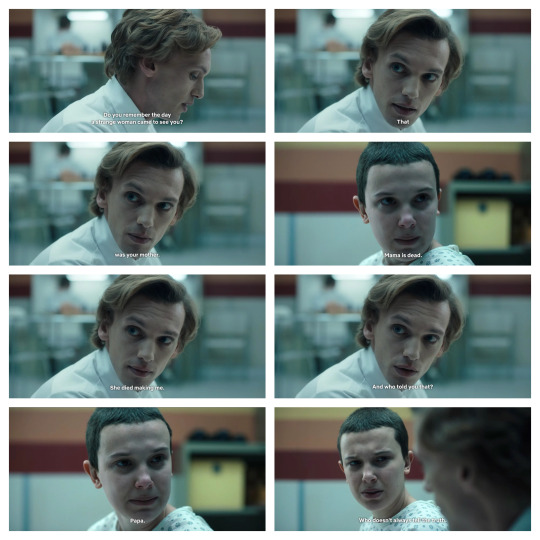
just like One doesn't exist.
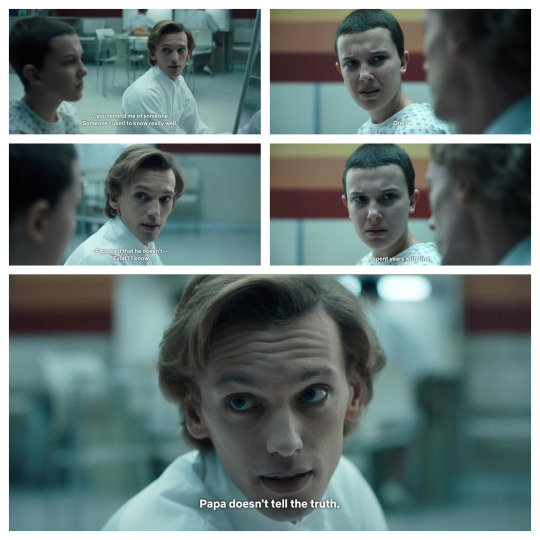
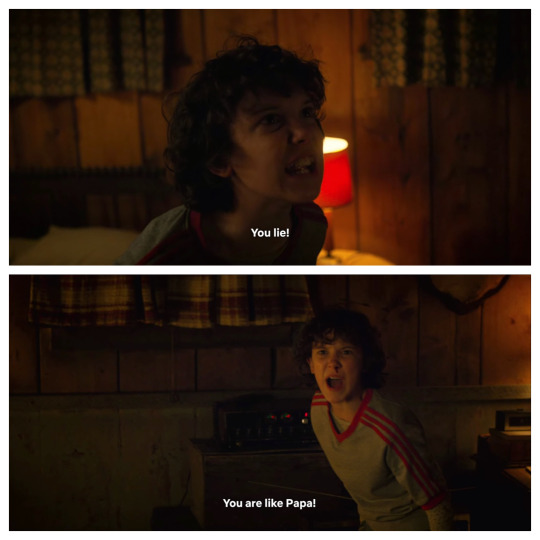
And whoever you are, either you aren't home (which, you're "Terry's daughter" in Terry's home which was decorated for you in hopes that you'd come home 🤨)...or you aren't Terry's daughter.
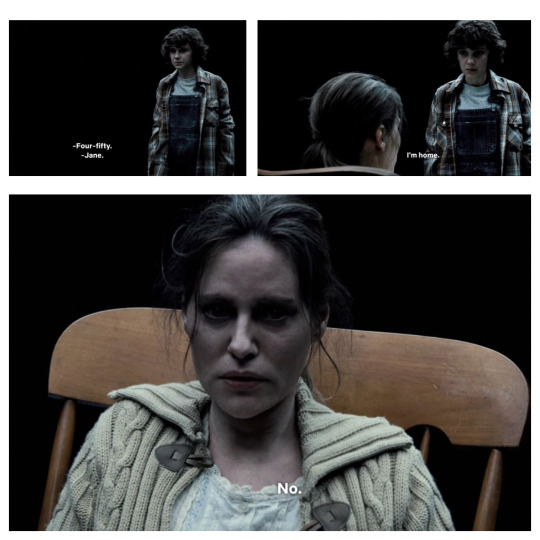
but wait: Mr. Mom? Perfect!
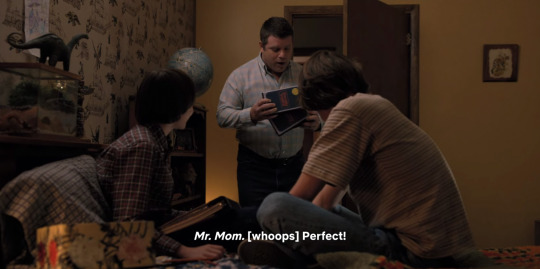
Mr. Mom...which leads straight to the lab going haywire:
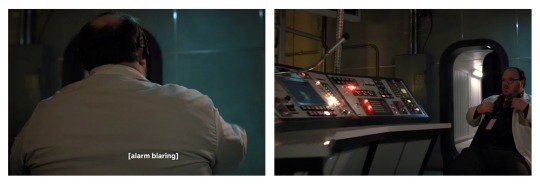
Because of the Mind Flayer, who we know is (most likely) a version of Edward.
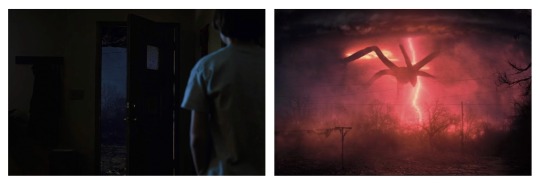

And "sleepyhead" is a parent thing...but it's specifically a mom thing, and it comes from the guy who's likely Edward. Why are you, as a man, so distinctly mother?
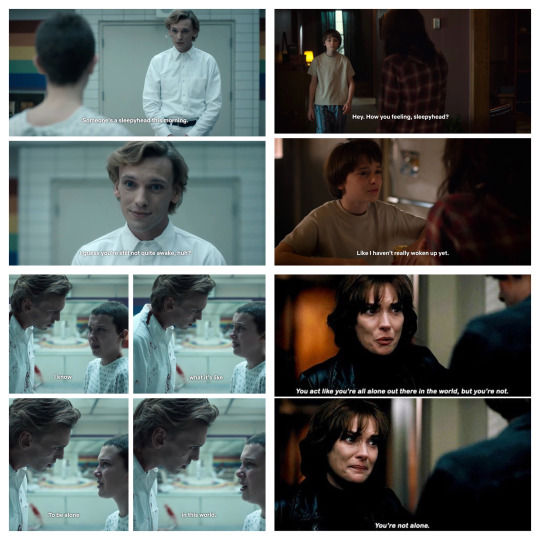
And so I'm looking at all of his God coding:
And I'm looking at his talk of spiders, particularly black widows, being the gods of our world:
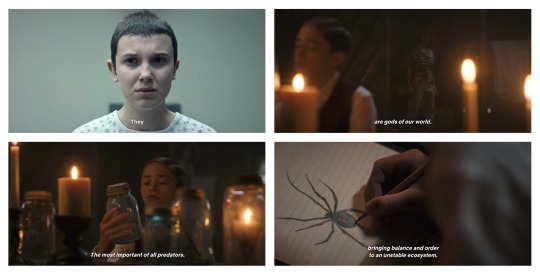
There's also this particular dialogue parallel with Carrie's mother:
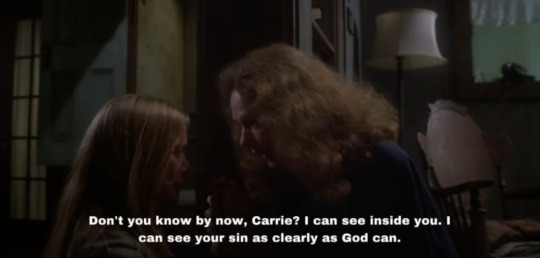
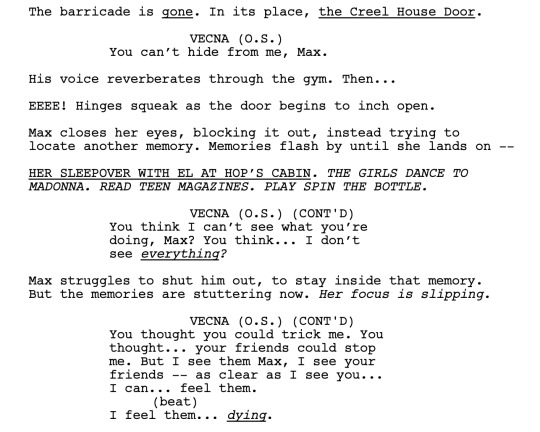
As well as Black Widow "God of Our World" 001 and Henry "Sensitive (Gay) Child" Creel, framed this way in back to back shots.
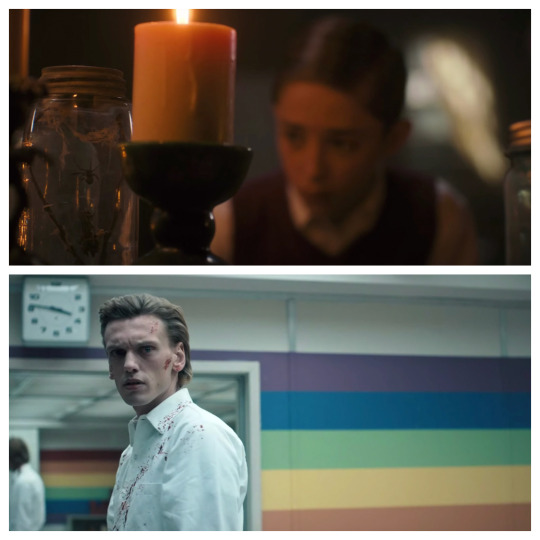
One of them has the rainbow flag and the other's got the black widow spider, makes sense...right? (Sure. Except not really.)
He also has a ton of God coding in his music choices:
Except, when we look at the songs he alone or he and El are overlaid with...Akhnaten is functionally a mezzo-soprano. In the pieces we hear specifically, Akhnaten sings in the same range or higher than Nefertiti.
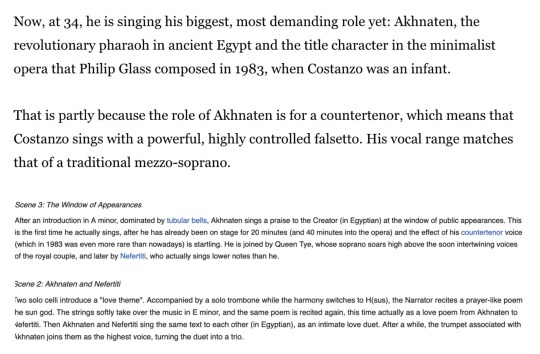
Which then gets me thinking about the Silent Hill parallels (that Em has talked about here), and specifically this one line of dialogue from Dahlia:
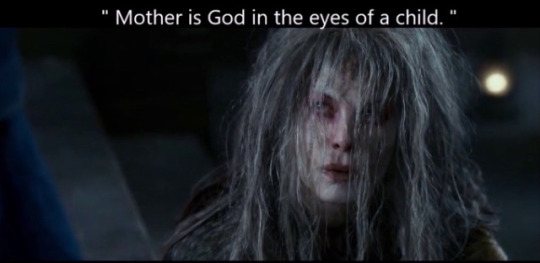
And the fact that every single black widow spider reference regarding Henward/Vecna/001 has been about female black widows, never male ones:
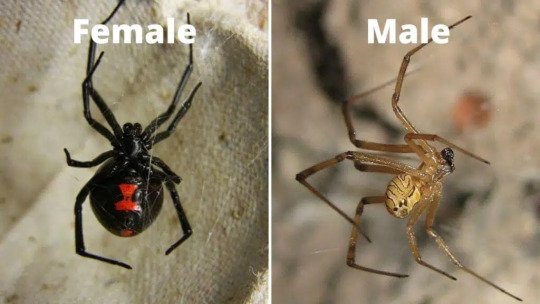
As well as a good portion of his rant being about:
- Being vaguely broken (what's wrong with him is never said)
- His kinship with spiders (specifically the female black widows)
- Society's oppressive made-up rules
- Being forced to pretend (unspecificed as to what, exactly, he's pretending about...all we get is "a silly, terrible play")
- Reproduction
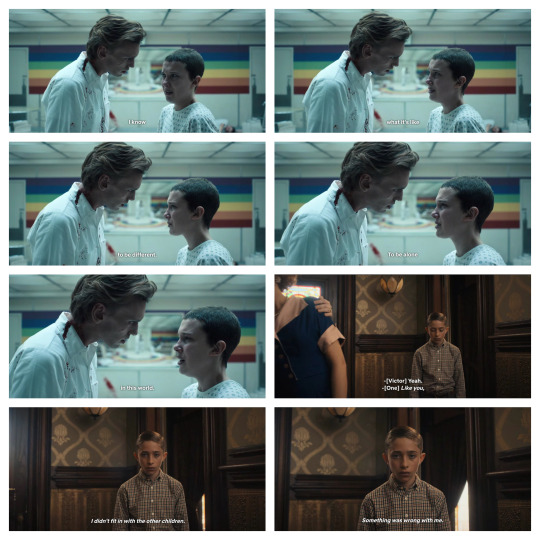

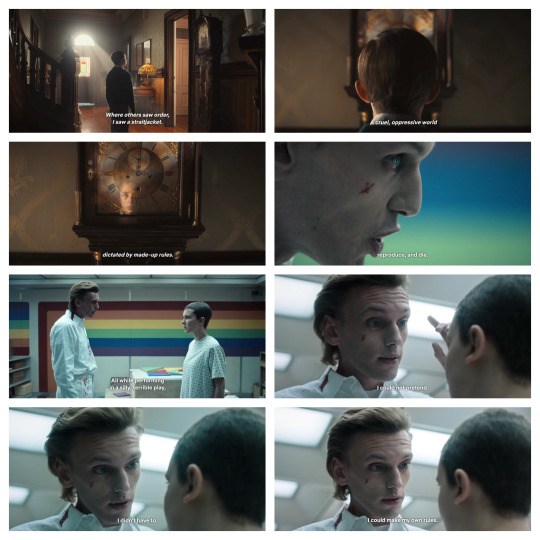
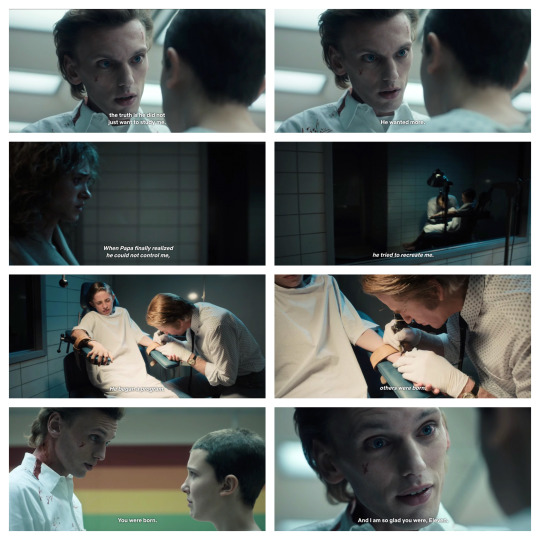
Then the fact that Vecna kind of has a thing for showing up as mothers:

And on top of all that...the fact that Vecna somehow lost his dick along the way. Where did it go????????
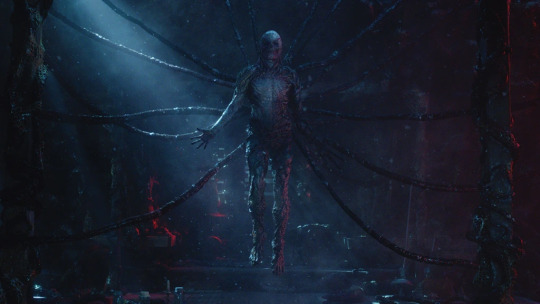
There's also all the birthing and reproduction imagery that goes along with the UD, most blatantly in the scene where El crawls out of the same hole the Demogorgon came through:

As well as these movies from the ST4 Movie Board:
Ace Ventura Pet Detective: Finkle has a sex change to assume a new identity and seek vengeance.
Let The Right One In: Vampire girl who is really a boy being forced to live as a girl
Sleepaway Camp: Girl named Angela who is actually a boy named Peter being forced by his aunt to live as a girl after his twin sister (the real Angela) was killed in an accident. (Wibble knows more about this one than I do, but I'm staring at Peter Ballard and all of our Angela's parallels to the lab)
Splice: Female Human-Animal hybrid "dies" (is actually in a coma) and undergoes a spontaneous sex change to male and proceeds to go berserk.
Silence of the Lambs: Main villain is a blonde, wavy-haired cross-dressing serial killer.
And then with the parallels to Room (even if it isn't on the ST4 Movie Board):
Plus Will's Alan Turing poster and the castration stuff that goes along with that..and the "Henry" that shows up behind him:

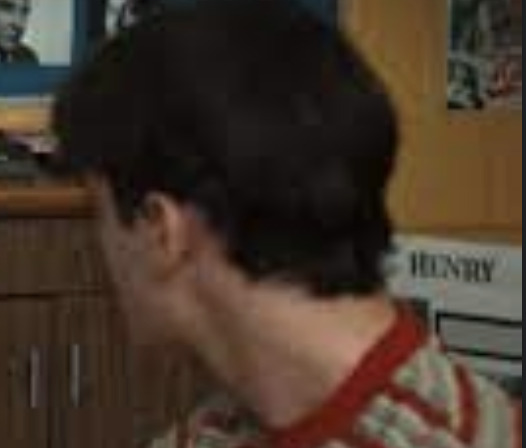
What in the gender is going on here?
#martin brenner. what did you DO.#he wanted more. and soon...you were born.#henry creel#edward creel#henry/vecna/001#edward/vecna/001#st theory#stranger things theory#stranger things
276 notes
·
View notes
Text
Love is Vulnerability (Week 6)
Moonlight follows Chiron, a boy who grew up in a black neighborhood as a queer individual and how he explores his queer identity and masculinity based on societal expectations. Although the film focuses on gender, race and this one specific individual, I think what it reveals about performativity and identity can be applied to all individuals in the society because we are all subject to perform under certain social norms in order to survive and to be welcomed.
I really liked Demory’s analysis of the film in the article and I agree with a lot of the article’s arguments. This blog will be me expressing my commentary in response to Demory's comments on the film. My first impression of the film is that it feels very real and that instead of viewing them as fictional characters in a story built by the director, the characters seem to be real life individuals that I can encounter walking down into a particular neighborhood. Such realness owes to the complexity and ambiguity that all the characters share. Juan, the local drug dealer, is both this father figure that provides love and care to Chiron and the direct root of his mother’s drug problems. Kevin, Chiron's friend, is both a supporting witness who knows the secret side of Chiron and the person who betrays him and hits him in public in order to fulfill societal expectations of masculinity. The complexity and multidimensionality of all characters all support the theme that everything is a facade and the nature of living under social norms is performativity. Rather than viewing a person and judging their appearance, putting negative labels on them, it is important to think of how their environment impacts and shapes them to be like that, or whether that environment even allows them to deviate and be different. Notably, Chiron’s adult image starkly contrasts to his childhood self. People who do not know him might see him as an intimidating and tough drug dealer but he is actually a sentimental and sensitive person who trains himself to act tough to avoid troubles.
Demory describes how the film is queer not only in having characters that are queer, but that it displayed narrative discontinuity and alternativeness. Oftentimes films tell stories chronologically and show how stories take place amidst continuous time. This film breaks this norm and focuses on three distinct periods of Chiron’s life and adopts multiple time ellipses in between where we do not know exactly what Chiron has been through, giving us that room to analyze and interpret what Chiron has experienced based on context. This three-act design and discontinuity highlight the difference of Chiron at the different stages and demonstrates how society gradually conditions and disciplines a person. This narrative structure, according to Demory, also escapes the conventionality of characters reaching a heteronormative happy ending, where male characters are portrayed to have succeeded in their careers and female characters are presented to have married, as if this is the written and ideal script of how people’s lives should go.
Moonlight’s escape from conventional storytelling and use of a different structure allows us to focus on the now, and analyze Chiron’s actions in detail, through which we see how gender performativity dictates his life and his approach to love. Demory refers to Judith Butler’s concept of gender performativity to show how people, learning from their environment, do a series of repeated actions to maintain a uniform presentation or performance of their gender to fit societal standards. For Chiron, this uniform performance that he puts on at last is being a tough drug dealer. He seems completely different from his teen and child self and transforms from being bullied for seeming weak and gay to someone who perfectly fits the stereotypical image of a masculine man. Yet, despite usual success in consistently maintaining such performativity, there is an unknown, which is the “‘excess’ that is always threatening to erupt within the intervals of those repeated gestures and acts that construct the apparent uniformity of heterosexual positionalities, indeed which compels the repetition itself, and which guarantees its perpetual failure” (Demory 363). From the hard shell and facade that is built from repetitive performativity we see hints of Chiron’s original self poking through and all of the moments where this “excess” does emerge is when Chiron is with someone whom he loves. That sensitive, sentimental, emotional, and vulnerable Chiron comes back, almost ironically contrasting against the macho and stereotypically manly image he has as an adult.
Although his mother has been a very irresponsible figure throughout his life and he tries to escape from her presence and be as independent as possible, when his mother does apologize to him he can't help but cry. Such uncontrollable revelation of his true emotions shows that it has been very difficult to navigate life as an unsupported child with no proper adult guidance. Despite his strong physical physique and how he seemingly has his life collected, internally the emotional support from the mother figure is still missing and the resulting emotional vulnerability persists. More of such revelation takes place when he meets Kevin, the only person who is aware of his queer identity and has even explored it with him together. “You the only man that’s ever touched me.” He says to Kevin. Even though Kevin has betrayed him in public, he seems to acknowledge that they are both products of their environment and both are struggling to survive and not be picked on. That love, bond, and trust they share makes complying to social norms unnecessary and strips away the barrier Chiron builds for himself. In his eyes the awkward yet resilient teenager comes back to life. Therefore, if our love for people differentiates them from all other people in this world, then what characterizes or defines love is probably the sense of security in this relationship that allows us to be vulnerable, the most raw and original versions of ourselves, free of worrying of judgment.
The vulnerability love enables us to feel and share juxtaposes with the empowerment that this revelation of “weakness” brings. Thus, in the end we see Chiron in the sea. As the environment continues to impact him, Chiron seems to reach a point of self-reconciliation, standing firmly as the currents and waves beat on. Indeed, nothing is more powerful and assuring than knowing that it is okay to just be you around the ones you love.
1 note
·
View note
Text
I think something that needs to be discussed is that this homophobic harassment campaign against Dream is not new. It has existed since the start of his career.
People clocked him as gay and started calling him slurs. Dream once tried to extend sympathy to his queer fans over being called gay slurs even though he is not gay. And people told him he’s trying to farm pity, that he’s never going to experience homophobia. Dream had to delete his tweet that was only trying to connect with people. And as a man who has same sex attraction yes it is very much ‘real’ homophobia to call him slurs.
So many people saw him and George and either decided they’re gay or queerbaiting and pretending to be gay for benefits. Now I don’t think I need to explain but I will. The notion that coming out provides you with any sort of benefits is entirely rooted in conservatism and specifically transphobia. They invented this narrative that being a certain identity shields you from the world. Only so they can accuse people of faking and trying to ‘steal’ from actual minorities. Anyone who’s ever existed off Twitter knows this is complete bullshit.
As well to accuse someone of queerbaiting is to fundamentally misunderstand the term. Queerbaiting is when a corporation hints at but does not follow through on giving queer rep to draw in a queer audience. Dream has never marketed himself to a queer audience he grew one naturally because many of us identify with him. Dream is a queer human being yes but he can never be representation in a way a movie character can. Dream and George’s friendship has always been the way it is as their friends have confirmed. They are not under an obligation to act ‘less gay’ because it upsets people. That is people trying to disguise their uncomfortableness with same sex attraction and flirting under the guise of protecting the poor kids watching them. Think of the children will always be homophobic rhetoric.
And when this false narrative of protecting queer children builds up what happens is real people are backed into a corner and told they must come out or they will be called homophobic and harassed. Telling someone to come out is a horrible thing to do. And it is disgusting to see so many ‘leftists’ insist that they are doing the right thing. Dream owes nobody anything about himself or his sexuality. Never has and never will.
But Dream has come out as queer three times. Once winter 2021 on a Reddit post where he said he does not identify with any labels and his sexuality is still uncertain to him. Now in April 2022 he has tweeted again that he’s not gay because he’s attracted to women but also he is attracted to men. And then on stream days later to 115k people live stated that there is gay which he is not but that doesn’t make him straight. There is a whole spectrum and he’s somewhere and he doesn’t owe anyone anymore than that. (Also everyone saying Dream isn’t gay therefore straight is being obtuse on purpose. Dream uses gay very obviously to mean homosexual attraction never as an umbrella term. He always says LGBTQ+ community when he wants to refer to the entire queer community.)
And when Dream did come out what did he get? He was invalidated to his face. He was told he’s wrong and bad for responding to that invalidation. He was told he’s not queer enough that unlabeled doesn’t count. That it’s only damage control even though those same people were demanding he come out for making gay jokes. He was doxxed and harassed. People who’ve been sitting on this clip for nearly a year released something from eight years ago intentionally disrupt Dream’s coming out. Black and Muslim fans of Dream specifically but in general as well were being weaponized to cover up homophobia. And when Dream’s black and muslim fans stepped up and said they know it’s old but would like Dream to say something but it doesn’t change the homophobia people started calling them racial slurs. When Dream apologized for the edit, white people started rewriting the narrative even further. Denying any lack of support for Dream and blaming it entirely on the edit even though that was spread as a response to Dream’s coming out. And completely neglects to mention Dream’s apology and speaks over Dream’s black fans.
Nothing about how Dream is being treated is acceptable. He like every queer person is owed your validation. It is not a pick and choose. You are a homophobe if you think it is. Dream deserves support and he deserves a massive fucking apology.
438 notes
·
View notes
Text
which individual angels are doing drag? an investigation
anna is just trans. like drag and trans are not mutually exclusive but anna is very much trans and not doing drag. she falls into humanity, rebukes being an angel entirely, is literally reborn into a specific human gender and body which she did not previously have and is entirely “hers.” it’s so straightforwardly a transition metaphor she literally went on e got surgery moved to an entirely different continent and lived stealth. verdict: not drag
benjamin is not doing drag but he IS doing this fascinating thing where he allows his vessel to maintain like. a conscious self. that is gendered differently than he is. and they are in active conversation and have like a Relationship. within the world of the show this is just him not doing possession and staying in his chill angel nongender, but it is readable as a metaphor for like. trans dissociation. “he’s an angel his vessel is a woman” washing your hands clean of your gendered body and the way it’s read by the world and being like that’s NOT me that’s a separate thing entirely. it’s kinda hashtag born in the wrong body which i have big political problems with as a narrative but like it’s there. verdict: not drag
raphael despite being only one of two angels to switch gendered vessels is not doing drag because he is not doing gender, he is doing power. like most of the other angels he is using vessels as like an indifferent tool he literally just happens to take two (differently gendered) vessels instead of one. obviously the narrative is not as blasé about this as he is and there are some weird anxious transmisogynistic comments about it from dean and crowley (with their silly human genders) but nevertheless: not drag because raphael does not care about gender and performing.
also, the fact that raphael and benjamin are 2/3rds of the Black angels on the entire show and are both gendered in a way that’s non-normative/flexible/fluid is really interesting in the context of what c. riley snorton calls the “fungibility” of Black gender which is “revisable within blackness as a condition of possibility” (fungible = “able to replace or be replaced by another identical item; mutually interchangeable”). obviously like all gender, the gendering, and drag or lack thereof, on the show is inextricable from race.
if raphael is doing not gender but power, then ishim is doing gender but not drag. like most of the male-vesseled angels are incidentally a man but ishim is a man in a way that’s VERY important to the story of lily sunder which is like specifically about the abuse and control he has/had over her and the way he engages with her as a woman. ishim does gender because it’s a convenient way to get to power in v disturbing ways. however: not drag
hannah actually is kind of doing drag! like part of this is just the fact that she keeps her incongruously feminine name while in her second vessel, but also with canonically gay cas who rejects her advances right before kshdjkfkds it’s like. she’s like Oh Fuck i need to consciously Do A Gender that is not “my own” rn. the wikipedia page for hannah’s unnamed second vessel refers to her with she/her pronouns even as she possesses “the man”. the show DELIBERATELY avoids gendering her in her second vessel which is so fucking funny. but like. hannah does problematic drag she’s a het woman drag king who hits on gay men when she’s dragged up and complains about there being too many gays on the drag circuit/the oppression she faces as a straight performer. fucking obsessed with her. verdict: drag
gabriel IS doing drag here’s my take. obviously by now we’re moving further from the text and closer into fun times. anyways the trickster is gabriel’s drag persona. like so much of drag is marked by a lack of self-seriousness and a willingness to lampoon both oneself and gender and literally just fuck around and produce elaborate constructs. gabriel never takes himself seriously, has an elaborate persona to fuck with people, creates absurd fantastical worlds with deeply exaggerated Roles for sam and dean and also a literal audience. also, short king. absolutely: drag
cas is doing drag until he transitions. like he gets close enough to humanity to have a particular kind of investment in the gendered form he’s doing, and though he’s not Performing Exaggerated Maleness in the way that dean and less so sam do, he kind of gets closer to understanding what gender signifies and caring about the (gendered) body he inhabits. obviously falling for dean is a big part of him starting to care about/do gender to a degree — desire binds him closer to gender, it’s all very andrea long chu “i have never been able to differentiate liking [men] from wanting to be like them.” anyways he kind of does drag for a bit until he eventually just transitions and becomes gay and trans at the same time. and has like. a very sincere but not exaggerated or performed relationship to like Oh this is my body and i have a gender and i live here. verdict: drag, until it’s not
bonus round: miriam is doing drag because i like her
official drag count: 2.5
#aaaaaand scene#indebted to ziz for deeply helping me hash this out last week#sasha.txt#spn#re: angel gender#it's JUST so fucking interesting#also miriam WILL be doing drag in my banesnatural#spn er&m
367 notes
·
View notes
Text
here’s my analysis of a 14-yr-old supernatural episode
so remember that episode where sam fucked a werewolf? because he related to her unwilling monstrosity? well that episode is actually just about dean starting to come to grips with his childhood and his sexuality.
if you ship w/ncest do not interact. this post is not anti-sam either btw.
content warning: discussions of childhood trauma, internalized homophobia, guns, killing.
does include some images with Image Descriptions following them.
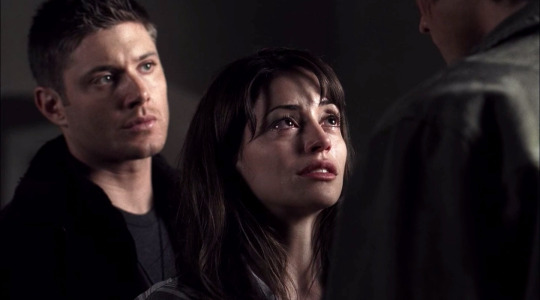
[ID: An over-the-shoulder close-up shot from the episode, focused on Madison, the werewolf, as she cries. Dean is standing behind her. They are both looking at Sam, whose shoulder is on the edge of the frame. End ID.]
Brief episode recap just in case u don’t remember. This ep is 2x17 “Heart.” Sam and Dean are hunting a werewolf. They discover that the woman they interviewed, Madison, is a werewolf (not THEE werewolf, but one of them). Sam develops a lil crush on her <3 I wrote the majority of this after watching it for the first time in almost SIX years, so i was just vibing the whole time UNTIL the last shot changed it all for me. So let me explain!
Three important points that i will refer back to:
1. The episode begins with Dean being excited to hunt a werewolf because "what about a human by day, a freak animal killing machine by moonlight don't you understand? I mean, werewolves are badass. We haven't seen one since we were kids."
2. Then the episode centers on Sam and his relationship with the werewolf woman and his own monstrosity: "[Dean: Sam, she's a monster and you're feeling sorry for her?] Maybe I understand her."
3. BUT THEN the last shot of the episode is of Dean crying as music plays (see below for the specific lyrics) and then Dean jumps at the sound of the gunshot. That's it! That's the end of the episode!
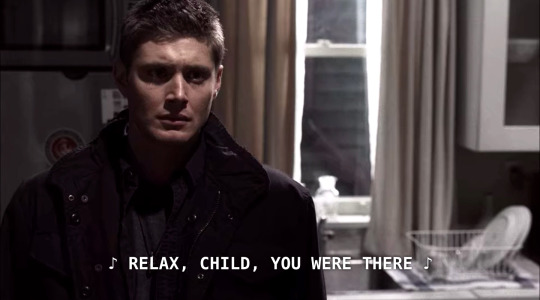
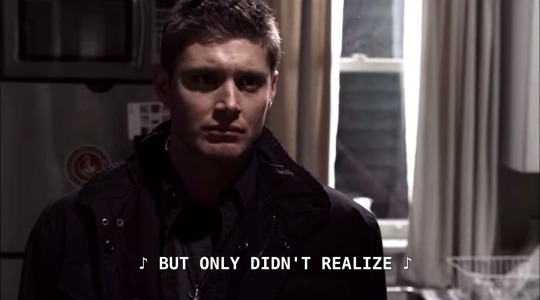
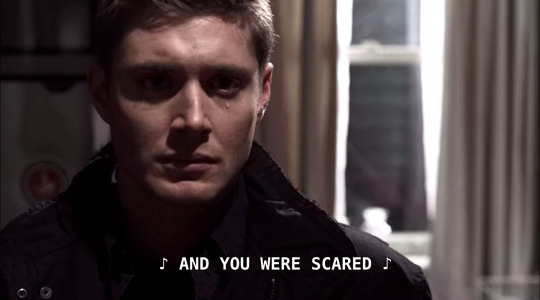
[ID: For all three screencaps, Dean is looking torturously sad. Each one is zoomed a little bit closer to his face than the last. In the last image, Dean sheds a single man tear. The captioned lyrics for the first one say "Relax, child, you were there." The second says "but only didn't realize" and the third says "and you were scared." End ID]
Even though the story is supposed to be about Sam and his monstrosity, and partly about his relationship w/romance since this is the first person he’s slept with since Jess died (at least with what is shown on screen)...the Dean Sandwich tells us otherwise. We're supposed to be taking away something about DEAN here. Like, that's the whole purpose behind the last shot focusing solely on Dean instead of Sam who is AT THAT MOMENT, KILLING THE GIRL HE HAS FEELINGS FOR. It's literally a heartbreaking, devastating, super traumatic thing for Sam to be going through, but instead we're watching Dean as a single tear slides down his face lmao. It's because this episode is about DEAN, and furthering his story.
Let’s not queer this just yet. The death of the werewolf is about/representing his loss of innocence. It's a violent disconnect from his childhood. Point # 1 shows that he is fascinated by werewolves because since he was a kid he thought they were badass, not to mention all the werewolf films he references throughout. Then, through the music lyrics over that last scene, they mirror that theme of childhood. They’ve done this before, having the diegetic music directly reference what the characters are going through. No different here: Dean is the child they’re referring to.
I have to reiterate that that's the last thing we hear before the gunshot cuts the music short and then the cut to black. "You were scared" is the last thing we hear before the gunshot, as Dean cries. ALSO I have to reiterate that Dean was looking forward to killing a werewolf and shooting it himself. So it's super fascinating that, not only is Sam the one that kills the werewolf, WE DON’T EVEN SEE IT HAPPEN.
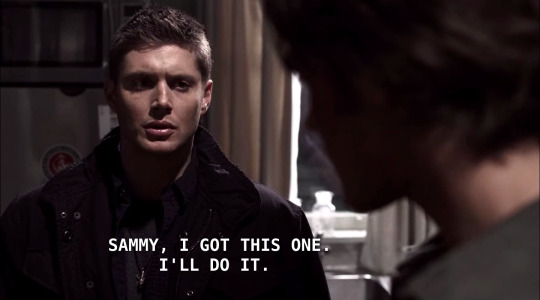
[ID: A medium-close shot of Dean as he looks at Sam, who takes up the right half of the frame. The caption says, “Sammy, I got this one. I’ll do it.” End ID.]
Am i gonna have to say this now? The werewolf is a metaphor, okay? It's a metaphor for his innocence, which is long-dead, forever doomed. I mean, a lot of kids love werewolves because they ARE badass! It's a classic monster that anyone could easily obsess over, and with Dean's childhood it must've seemed even cooler, knowing they're real and having the power to kill this "mythical" beast. So the way he's looking forward to killing one is the way a child imagines themselves as a hero.
But what happens instead is a tragic mercy killing. It's flipping his fantasy completely on its head, and it makes Dean realize that.....his fantasies are just fantasies. They aren't real, never would be. There's nothing heroic about killing this werewolf. It's tragic as hell. When he offers to kill her himself, it's just to relieve Sam's burden, but he's reluctant still. Because, as he keeps saying, he doesn't want to be a hunter! He doesn't want this life! He's tired of killing! And that's also what he's mourning as he cries and startles at the gunshot. His fantasies will never be real and his childhood could never have been normal and he never got a chance to be a kid because being a hunter was thrust on him at such a young age. And now it feels inescapable.
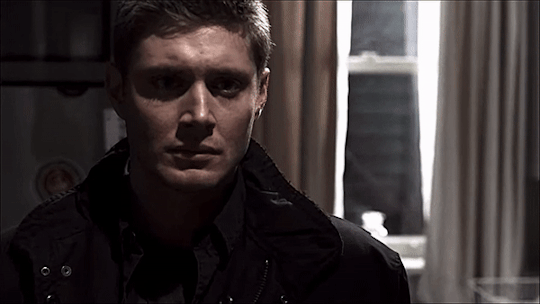
[ID: A gif of the slow zoom on Dean’s face as the single tears slips down his cheek. He jumps at the gunshot, then blinks and his lip wobbles. End ID.]
So now we can queer it :-) Of course all monster stories can be easily queered, but werewolves are popularly queered. The first example that comes to mind is An American Werewolf in London (1981) isn’t an overtly queer film (though it is Jewish!) but it’s definitely read that way by a lot of people!! Anyway the film was directed by John Landis which JUST SO HAPPENS to be the pseudonym Dean goes by in this episode. hmm. (Also, interestingly, the BTVS ep where the first gay character comes out references this film too)
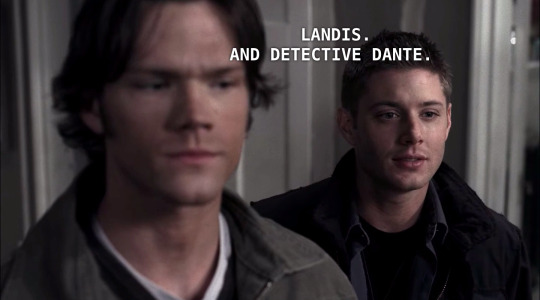
[ID: Sam and Dean are standing close to each other. Sam is in the foreground, not in focus. Dean, behind him, says, “Landis. And Detective Dante.” End ID.]
There’s this essay about the queer werewolf that you can read here (and they also talk about fandom in it! very fascinating), where they say in the intro: “the werewolf seems an obvious choice as a queer monster with its identity-disrupting hybridity, as well as its atavistic, and, thus, disallowable sexuality.” A lot like Kristeva’s theory of the abject body! which is popular in queer theory.
This episode is then queering Sam—his attraction to the werewolf makes him abject—but it also queers Dean thru the way his attitude towards the werewolf transforms (get it?) throughout the ep. His desire and eagerness to kill the werewolves is obviously ingrained in him from John’s parenting. Consider what he said in 2x03 “Bloodlust”: “And the way he raised us, to hate those things—and man, I hate them, I do.” In conjunction with the monsters in the show being seen as queer allegories (the gorgon, as an example of an explicit comparison), Dean’s excitement to kill the werewolf can be read as internalized homophobia and repressing any of his own feelings.
Remember, though, right before that line in “Bloodlust,” he also said, “What if we killed things that didn’t deserve killing?” He’s really beginning to question whether all monsters are bad, and what it means to kill them. Is he also questioning what he believes of queer people? What John believed of queer people? The loss of innocence and queering both slot together through that final shot, imo: he’s crying because he realizes his fantasies aren’t real, but he’s also mourning the fact that he never could have had the chance to grow up without John’s control, and now it’s forever tainted his worldview. What else could he have been without that? (The answer is evident in 4x17 “It’s a Terrible Life.”)
Dean was taught to hate queer people but he doesn't want to. He wants to get out of the life but it feels inescapable. He wants to kill a werewolf and then when he has the chance, he doesn't want to. He actually cries as it's killed. It scares him, having to confront that what he thought he knew was wrong, but he knows all the same that he’ll never have the chance to have grown up without that.
#is anyone up? anyone wanna read this? i finished this instead of doing homework#sorry the end is bad LMAO i'm notoriously bad at writing conclusions#also i want to say that the monster allegories in SPN more often have to do with race and not homophobia. but this episode sticks out to me#as representing queerness instead of race. especially because they set it up as compared to Sam's story which is SO queer.#spn#what do i tag this#ej.pdf#supernatural#bi dean#my professors would give me a bad grade on this#portfolio
105 notes
·
View notes
Text
Not Up For Interpretation - An Essay On Nonbinary - Erasure
(Trigger Warning: Misgendering, Transphobia, Nonbinary-phobia)
If you’ve been following me for a while, you probably know this was a long time coming. I’ve made several posts about my frustrations concerning this topic and how much it hurt me just how socially accepted erasing an entire identity still is. While representation marches on and things have become better for nonbinary people as a whole, we still battle with a lot of prejudice - both intentional and unintentional.
In this essay, I want to discuss just how our identities are being erased almost daily, why that is harmful and hurtful and what we all can do to change that.
Chapters:
What does Non-binary mean?
Nonbinary- representation in media
So what’s the problem?
How do we fix it?
1. What Does Non-binary Mean?
Non-binary is actually an umbrella term. It includes pretty much every gender-identity that’s neither one or the other so to speak, for example, agender.
Agender means feeling detachment from the gender spectrum in general. If you’re agender, you most likely feel a distance to the concept of gender as a whole, that it doesn’t define you as a person.
There are many identities that classify under non-binary: There’s gender-fluid (you feel you have a gender, but it’s not one gender specifically and can change), demi-gender (identifying as a gender partially, but not completely) and many others.
Sometimes, multiple non-binary identities can mix and match.
Most non-binary people use they/them pronouns, but like with so many things, it varies.
Some nonbinary-people (like me) go by two pairs of pronouns. I go by both she/her and they/them, because it’s what feels most comfortable at the moment. But who knows, maybe in the future I’ll switch to they/them exclusively or expand to he/him.
There is no one defining non-binary experience. Nb-people are just as varied and different as binary people, who go by one specific gender.
There are non-binary people who choose to go solely by she/her or he/him and that’s okay too. It doesn’t make them any more or less non-binary and their identity is still valid.
If your head’s buzzing a bit by now: That’s okay. It’s a complicated topic and no one expects you to understand all of it in one chapter of one essay.
Just know this: If a person identifies as non-binary, you should respect their decision and use the pronouns they go with.
It’s extremely hurtful to refer to someone who already told you that they use they/them pronouns with she/her or he/him, or use they/them to refer to a person who uses she/her.
Think about it like using a trans-person’s deadname: It’s rude, it’s harmful and it shows complete disrespect for the person.
Non-binary people have existed for a very long time. The concept isn’t new. The idea that there are only two genders, with every other identity being an aberration to the norm, is largely a western idea, spread through colonialism.
The Native American people use “Two-Spirit” to describe someone who identifies neither as a man nor a woman. The term itself is relatively new, but the concept of a third gender is deeply rooted in many Native American cultures.
(Author’s Note: If you are not Native American, please do not use it. That’s cultural appropriation.)
In India, the existence of a third gender has always been acknowledged and there are many terms specifically for people who don’t identify with the gender that was assigned to them at birth.
If you’re interested in learning more about non-binary history and non-binary identities around the world, I’d recommend visiting these websites:
https://nonbinary.wiki/wiki/History_of_nonbinary_gender
https://nonbinary.wiki/wiki/Gender-variant_identities_worldwide
https://thetempest.co/2020/02/01/history/the-history-of-nonbinary-genders-is-longer-than-you-think/
https://www.teenvogue.com/story/gender-variance-around-the-world
Also, maybe consider giving this book a try:
Nonbinary Gender Identities: History, Culture, Resources by Charlie Mcnabb
2. Non-binary Representation In Media
The representation of non-binary people in mainstream media hasn’t been... great, to put it mildly.
Representation, as we all know, is important.
Not only does it give minorities a chance to see themselves in media and feel heard and acknowledged. It also normalizes them.
For example, seeing a black Disney-princess was a huge deal for many black little girls, because they could finally say there was someone there who looked like them. They could see that being white wasn’t a necessity to be a Disney princess.
Seeing a canonically LGBT+ character in a children’s show teaches kids that love is love, no matter what gender you’re attracted to. At the same time, older LGBT+ viewers will see themselves validated and heard in a movie that features on-screen LGBT+ heroes.
There’s been some huge steps in the right direction in the last few years representation-wise.
Not only do we have more LGBT+ protagonists and characters in general, we’ve also begun to question and call out harmful or bigoted portrayals of the community in media, such as “Bury Your Gays” or the “Depraved Homosexual”.
With that being said: Let’s take a look at how Non-binary representation holds up in comparison, shall we?
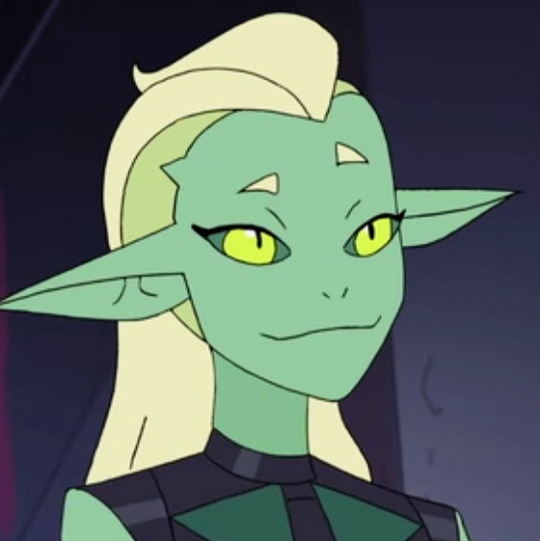
This is Double Trouble, from the children’s show “She-Ra And The Princesses Of Power”.
They identify as non-binary and use they/them pronouns. They’re also a slimy, duplicitous lizard-person who can change their shape at will.
Um, yeah.
Thanks, but no thanks.
Did I mention they’re also the only non-binary character in the entire show? And that they’re working with a genocidal dictator in most of the episodes they’re in?
Yikes.
Let’s look at another example.
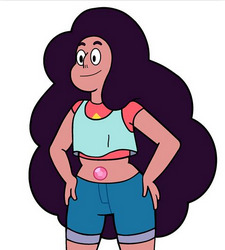
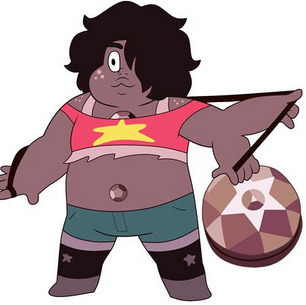
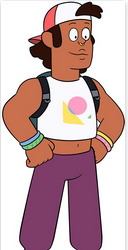
These three (in order of appearance) are Stevonnie, Smoky Quartz and Shep. Three characters appearing in the kid’s show “Steven Universe” and it’s epilogue series “Steven Universe: Future”.
All of them identify as non-binary and use they/them as pronouns.
Stevonnie and Smoky Quartz are the result of a boy and a girl being fused together through weird alien magic.
Shep is a regular human, but they only appeared in one episode. In an epilogue series that only hardcore fans actually watched.
Well, I mean...
One out of three isn’t that bad, right?
Maybe we should pick an example from a series for older viewers.
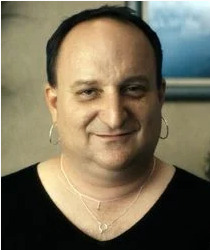
Say hello to Doppelganger, a non-binary superhuman who goes by they/them, from the Amazon-series “The Boys”.
They’re working for a corrupt superhero-agency and use their power of shape-shifting to trick people who pose a threat to said agency into having sex with them. And then blackmail those people with footage of said sex.
....
Do I even need to say it?
If you’ve paid attention during the listing of these examples, you might have noticed a theme.
Namely that characters canonically identifying as non-binary are either
supernatural in some way, shape or form,
barely have a presence in the piece of media they’re in,
both.
Blink-and-you-miss-it-manner of representation aside, the majority of these characters fall squarely under what we call “Othering”.
“Othering” describes the practice of portraying minorities as supernatural creatures or otherwise inhuman. Or to say it bluntly: As “The Other”.
“Othering” is a pretty heinous method. Not only does it portray minorities as inherently abnormal and “different in a bad way”. It also goes directly against what representation is actually for: Normalizing.
As a general rule of thumb: If your piece of media has humans in it, but the only representation of non-white, non-straight people are explicitly inhuman... yeah, that’s bad.
So is there absolutely no positive representation for us out there?
Not quite.
As rare as human non-binary characters in media are to find, they do exist.
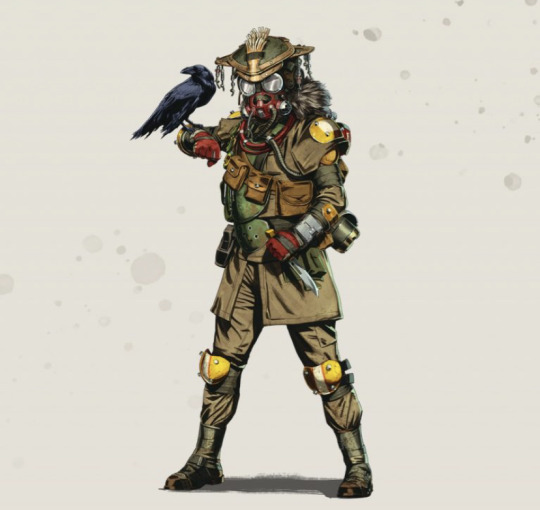
Here we have Bloodhound! A non-binary human hunter who uses they/them pronouns, from the game “Apex Legends”.
It’s been confirmed by the devs and the voice actress that they’re non-binary.
Nice!
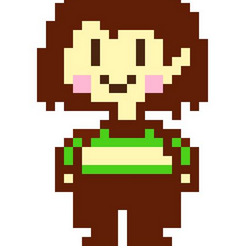
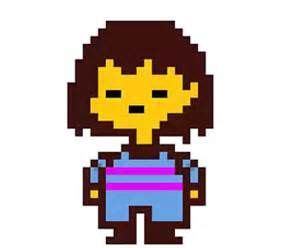
These are Frisk (bottom) and Chara (top) from the game “Undertale”. While their exact gender identity hasn’t been disclosed, they both canonically use they/them pronouns, so it’s somewhere on the non-binary spectrum.
Two human children who act as the protagonist (Frisk) and antagonist (Chara), depending on how you play the game. (Interpretations vary on the antagonist/protagonist-thing, to say the least.)
Cool!
......
And, yep, that’s it.
As my little demonstration here showed, non-binary representation in media is rare. Good non-binary representation is even rarer.
Which is why those small examples of genuinely good representation are so important to the Non-binary community!
It’s hard enough to have to prove you exist. It’s even harder to prove your existence is not abnormal or unnatural.
If you’d like to further educate yourself on representation, it’s impact on society and why it matters, perhaps take a second to read through these articles:
https://www.criticalhit.net/opinion/representation-media-matters/
https://www.pbs.org/newshour/arts/why-on-screen-representation-matters-according-to-these-teens
https://jperkel.github.io/sciwridiversity2020/
https://www.forbes.com/sites/quora/2019/05/22/why-is-equal-representation-in-media-important/?sh=25f2ccc92a84
https://www.theodysseyonline.com/why-representation-the-media-matters
3. So What’s The Problem?
The problem, as is the case with so many things in the world, is prejudice.
Actually, that’s not true.
There’s not a problem, there are multiple problems. And their names are prejudice, ignorance and bigotry.
Remember how I said human non-binary representation is rare?
Yeah, very often media-fans don’t help.
Let’s take for example, the aforementioned Frisk and Chara from “Undertale”.
Despite the game explicitly using they/them to refer to both characters multiple times, the majority of players somehow got it into their heads that Frisk’s and Chara’s gender was “up for interpretation”.
There is a huge amount of fan art straight-up misgendering both characters and portraying them as binary and using only he/him or she/her pronouns.
The most egregious examples are two massively popular fan-animated web shows: “Glitchtale”, by Camila Cuevas and “Underverse” by Jael Peñaloza.
Both series are very beloved by the Undertale-fanbase and even outside of it. Meaning for many people, those two shows might be their first introduction to “Undertale” and it’s two non-binary human characters.
Take a wild guess what both Camila and Jael did with Frisk and Chara.
Underverse, X-Tale IV:
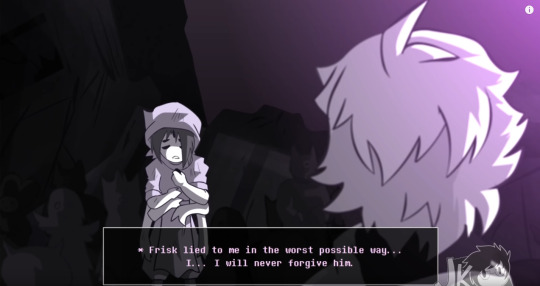
(Transcript: “Frisk lied to me in the worst possible way... I... I will never forgive him.”)
Underverse, X-Tale V:
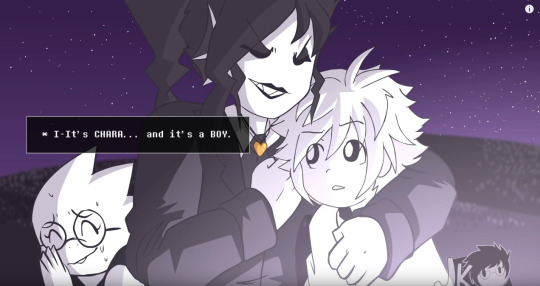
(Transcript: “I-It’s Chara... and it’s a BOY.”)
Glitchtale, My Promise:
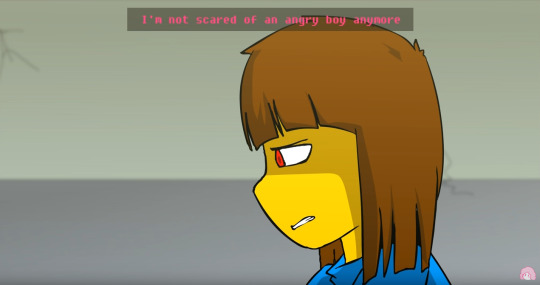
(Transcript: (Referring to Frisk) “I’m not scared of an angry boy anymore.”)
Glitchtale, Game Over Part 1:
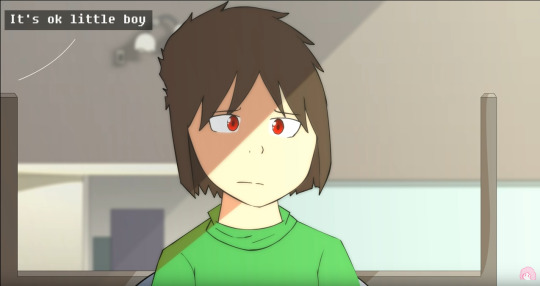
(Transcript: (Referring to Chara) “It’s ok little boy.”)
This... this isn’t okay.
Not only do both of these pieces of fan-art misgender two non-binary characters, the creators knew beforehand that Frisk and Chara use they/them-pronouns, but made the conscious choice to ignore that.
To be fair, in a video discussing “Underverse”, Jael said that only X-Tale Frisk and Chara, the characters you see in the Underverse-examples above, are male, while the characters Frisk and Chara from the main game remained non-binary and used they/them (time-stamp 10:34).
Still, that doesn’t erase the fact that Jael made up alternate versions of two non-binary characters specifically to turn them male. Or that, while addressing the issue, Jael was incredibly dismissive and even mocked the people who felt hurt by her turning two non-binary characters male. Jael also went on to make a fairly non-binary-phobic joke in the video, in which she equated gender identities beyond male and female to identifying as an object.
Jael (translated): “I don’t care if people say the original Frisk and Chara are male, female, helicopters, chairs, dogs or cats, buildings, clouds...”
That’s actually a very common joke among transphobes, if not to say the transphobe-joke:
“Oh, you identify as X? Well then I identify as an attack helicopter!”
If you’re trans, chances are you’ve heard this one, or a variation of it, a million times before.
I certainly have.
I didn’t laugh then and I’m not laughing now.
(Author’s note: I might be angry at both of them for what they did, but I do not, under any circumstances, support the harassment of creators. If you’re thinking about sending either Jael or Camila hate-mail - don’t. It won’t help.)
Jael’s reaction is sadly common in the Undertale fandom. Anyone speaking up against Chara’s and Frisk’s identity being erased is immediately bludgeoned with the “up for interpretation”-argument, despite that not once being the case in the game.
And even with people who do it right and portray Frisk and Chara as they/them, you’ll have dozens of commenters swarming the work with sentences among the lines of “Oh but I think Frisk is a boy/girl! And Chara is a girl/boy!”
By the way, this kind of thing only happens to Frisk and Chara.
Every other character in “Undertale” is referred to and portrayed with their proper pronouns of she/her or he/him.
But not the characters who go by they/them.
Their gender is “up for interpretation”.
Because obviously, their identity couldn’t possibly be canonically non-binary.
Sadly, Frisk and Chara are not alone in this.
Remember Bloodhound?
And how I said they’d been confirmed as non-binary and using they/them pronouns by both the creators and the voice actress?
It seems for many players, that too translated to “up for interpretation”.

(Transcript: “does it matter what they call him? He, her, it, they toaster oven, it doesn’t matter”)

(Transcript: “I’m like 90 % sure Bloodhound is a dude because he could just sound like a girl and by their age that I’m assuming looks around 10-12 because I’ve known many males who have sounded like a female when they were younger”)
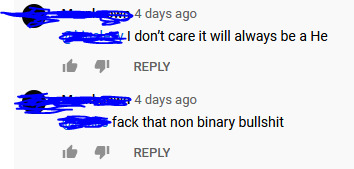
(Transcript: “I don’t care it will always be a He. F*ck that non-binary bullsh*t.”)

(Transcript: “Bloodhound is clearly female.”)

(Transcript: “I’m not calling a video game character they/them”)

(Transcript: “exactly. The face was never fully shown neither was the gender so I’d say it means that the player is Bloodhound. So it’s your gender and you refer to “him” as yourself. It’s like a self insertion in my eyes.”)
So, let me get this straight:
If a character, even a player character, uses she/her or he/him, you can accept it, no questions asked.
But when a character uses they/them, suddenly their identity and gender are “up for interpretation”?
This attitude is also widely prevalent in real life.
Many languages only include pronouns for men and women, with no third option available. Non-binary people are often forced to make up their own terms, because their language doesn’t provide one.
Non-binary people often don’t fit within other people’s ideas of gender, so they get excluded altogether. Worse, non-binary people are often the victims of misgendering, denial of their identity or even straight-up violence when coming out.
People will often tell us that we look like a certain gender, so we should only use one set of gendered pronouns. Never mind that that’s not what we want. Never mind that that’s not who we are.
Non-binary people are also largely omitted from legal documentation and studies.
We cannot identify as non-binary at our workplace, because using they/them pronouns is considered “unprofessional”.
We don’t have our own bathrooms like men and women do. Our gender is seen as less valid than male and female, so even that basic thing is denied to us. I’ve had to use the women’s restroom my entire life, because if I go into a male restroom, I’ll be yelled at or made fun off or simply get told I took the wrong door. It’s extremely uncomfortable for me and I wish I didn’t have to do it.
And since non-binary people aren’t seen as “real transgender-people”, we often don’t receive the medical care we need. This often renders us unable to feel good within our bodies, because the treatment and help we get is wildly inadequate.
It’s especially horrible for intersex people (people who are born with sex characteristics that don’t fit solely into the male/female category) who are often forced to change their bodies to fit within the male/female gender binary.
And you better believe each of those problems is increased ten-fold for non-binary people of color.
We are ignored and dismissed as “confused”, because of who we are.
Representation is a way for Non-binary people to show the world they exist, that they’re here and that they too have stories to tell.
But how can we, when every character that represents us is either othered, barely there or gets taken away from us?
We are not “up for interpretation”.
Neither are the characters in media who share our identity.
And it’s time to stop pretending we ever were.
For more information about Non-Binary Erasure and how harmful it is, you can check out these articles:
https://everydayfeminism.com/2015/08/common-non-binary-erasure/
https://www.dailydot.com/irl/nonbinary-people-racism/
https://nonbinary.wiki/wiki/Nonbinary_erasure
https://traj.openlibhums.org/articles/10.16995/traj.422/
https://medium.com/an-injustice/everyday-acts-of-non-binary-erasure-49ee970654fb
https://medium.com/national-center-for-institutional-diversity/the-invisible-labor-of-liberating-non-binary-identities-in-higher-education-3f75315870ec
https://musingsofanacademicasexual.wordpress.com/2015/05/11/dear-sirmadam-a-commentary-on-non-binary-erasure/
4. How Do We Fix It?
Well, first things first: Stop acting like we don’t exist.
And kindly stop other people from doing it too.
We are a part of the LGBT+ community and we deserve to be acknowledged, no matter what our pronouns are.
Address non-binary people with the right pronouns. Don’t argue with them about their identity, don’t comment on how much you think they look like a boy or a girl. Just accept them and be respectful.
If a non-binary person tells you they have two sets of pronouns, for example he/him and they/them, don’t just use one set of pronouns. That can come off as disingenuous. Alternate between the pronouns, don’t leave one or the other out. It’ll probably be hard at first, but if you keep it up, you’ll get used to it pretty quickly.
If you’re witnessing someone harass a non-binary person over their identity, step in and help them.
And please, don’t partake in non-binary erasure in media fandoms.
Don’t misgender non-binary characters, don’t “speculate” on what you think their gender might be. You already know their gender and it’s non-binary. It costs exactly 0 $ to be a decent human being and accept that.
Support Non-Binary people by educating yourself about them and helping to normalize and integrate their identity.
In fact, here’s a list of petitions, organizations and articles who will help you do just that:
https://www.change.org/p/collegeboard-let-students-use-their-preferred-name-on-collegeboard-9abad81a-0fdf-435c-8fca-fe24a5df6cc7?source_location=topic_page
6 Ways to Support Your Non-Binary Child
7 Non-Negotiables for Supporting Trans & Non-Binary Students in Your Classroom
If Your Partner Just Came Out As Non-Binary, Here’s How To Support Them
How to Support Your Non-Binary Employees, Colleagues and Friends
Ko-fi page for the Nonbinary Wiki
The Sylvia Rivera Project, an organization who aims to give low-income and non-white transgender, intersex and non-binary people a voice
The Anti Violence Project “empowers lesbian, gay, bisexual, transgender, queer, and HIV-affected communities and allies to end all forms of violence through organizing and education, and supports survivors through counseling and advocacy."
The Trans Lifeline, a hotline for transgender people by transgender people
Tl:DR: Non-Binary representation is important. Non-Binary people still suffer from society at large not acknowledging our existence and forcing us to conform. Don’t be part of that problem by taking away what little representation we have. Educate yourself and do better instead. We deserve to be seen and heard.
#non-binary#agender#demigender#gender identity#essay#erasure#lgbt representation#misgendering#undertale#she ra spop#apex bloodhound#doppelganger#steven universe
210 notes
·
View notes
Text
Thoughts:
I agree with the takes that say we likely won't see a return to 2005-era Russell T. Davies television. My point of reference would be something like, 2005-2008 Rusty is like a parallel to 2010-2013 Moffat, and 2023-onwards Rusty is more likely to parallel 2014-2017 Moffat. There's a clear split there where Moffat ditched some of his more egregious excesses as his showrunning matured (helped by dealing with cranky old professor Capaldi instead of... well still a nutty old professor, but trapped in the body of a 20-something Matt Smith) and I have a feeling Rusty will have developed in the same way.
Judging by what Russell has done since Doctor Who, I DO think the coming seasons will be gayer. How that will manifest, I'm not sure.
I've noticed a not-inconsequential number of people saying "ugh, not just another white man but THE SAME white man?? Truly shows the BBC's lack of creativity in this department". To which I say, you nincompoops. The success of the show hasn't been measured by the showrunners identity credentials, it's been measured by how much they love the show. A black woman might be a fantastic showrunner in general terms, but if she doesn't care deeply about the history and legacy of this show in particular, then it will never work. Not for Doctor Who. Steven Moffat didn't survive 8 years of the most vile hatred a showrunner has ever received (maybe apart from, fittingly, the Supernatural fanbase) because he was white. He survived it because he genuinely loved the show, and only now that we've seen the alternatives to his reign have people started missing what he brought to the show. Russel didn't return because the BBC will only hire white guys. He returned because he loved the show and he has the combination of work ethic and passion to make it succeed. The only truly alarming thing about this news is how few competent showrunners there are within the BBC network who care about Doctor Who.
It really is a tragedy how much of the public perception of the Doctor Who fandom is still tied up in Superwholock to this day. It has far, far too much legacy behind it, and likely a future ahead of it, to be lumped in with the other two. It deserves better.
I'm also seeing a lot of people calling out other people for saying that Doctor Who will no longer be "woke", and I think that speaks to a sharp divide in what those two groups mean by that one word. As I say, I fully expect RTD to embrace LGBT rep in the show in one way or another, but at the risk of No True Scotsmanning, I doubt most fans would think not to expect that. What they DO object to, I think - certainly what I object to - is the way that political content I could 100% have handled in the days of RTD and Moffat was executed under Chibnall. Rusty never had a character go "I'm gay by the way! Did I mention how gay I am? *dies immediately*". Moffat got preachier in later seasons but Capaldi's speeches were passionately delivered and relevant to the characters in the scene. Nobody ever turned directly to the camera to speak to the audience. Understanding Capaldi's speeches made you feel smart; Whitaker's made you feel smarter than the writer thought you were. Not one of the characters was ever so obviously a fictionalised version of a real political figure as The Donald Trump Character from Chibnall's tenure. Walking away from serious racist conflicts to hammer home the message that humans are the real monsters was never part of the Doctor's M.O. under Rusty. It's preachy, it condescends to the audience, it betrays things that the characters should stand for, and above all it's just not very intelligent or imaginative writing. That is what people object to. The hope is not that the Doctor will stop destroying Capitalism or Orwellian Regimes or Slave Labour ("Oxygen", "The Lie of the Land", "Planet of the Ood") to become 'un-woke', the hope is that RTD will actually be able to craft relevant political subjects into actually entertaining sci-fi stories again.
If even RTD can't make Doctor Who work for modern audiences (unlikely but possible), then we have some idea of who REALLY made post-2005 Doctor Who work, and that is Murray Gold.
22 notes
·
View notes
Text
Gender Thoughts Pt 1 and 2
The first time I put a binder on, a little under a week ago, I felt euphoric. Ever since I hit puberty very early on, I felt uncomfortable with my breasts. They never felt right on me, and even though I’ve come to love them sometimes, they still don’t always feel like they match up. I hated how people always looked at them, pointed out how much they showed in low cut shirts when I never even noticed they were--or even wanted them to. They were just there. I liked the way low cut shirts feel and look on me, I just can’t help these giant sacks of flesh that sit on my chest.
Except...now I can! I ran my hands over my smooth chest, feeling bright. I looked into the mirror, and felt something warm wash over me. I put on my new masculine clothes, letting my partner clip on my new suspenders. I realized that I was shaking as I looked at myself again… I looked like a boy. I felt like a boy. Like a man. And I liked it. I wanted it. Admitting that to myself was like coming home.
I remember being in sixth grade, walking around the track for my civil air patrol class. I had been slotted in with the rest of the girls, the boys walking ahead of us. I remember feeling uncomfortable being shoved in with only girls, and looking at the gaggle of boys ahead. The exact thought that whispered in my brain was “I wish I was a boy. I want to be like them, with them.” I never forgot that moment, and how strange it made me feel. How it was easier to shake that thought away, and dismiss those feelings. Except they never really left, did they?
I remember sitting on my bed, crying with my best friend kneeling in front of me. I remember telling her how I didn’t like feeling like a woman all the time. That I wished I could be a black shadow, monstrous, androdynous. Specifically like Venom. She took my hand, did my makeup all in black and helped me pick out the perfect black outfit to achieve that dark, gothic look. I was so incredibly happy and validated. But I still felt like something was missing.
I remember going into an Adam and Eve for laugh, not expecting much since I am an asexual with a low libido. I remember seeing packers and feeling my chest tighten. I never liked my genitalia--I had wished for a cloaca or something akin to that, but since that was biologically impossible for a human… I sometimes wished I had the opposite of a vagina. I frequently imagined what it would be like to have a penis. I frequently lamented the fact that I didn’t have one. I took the box up to the counter to ask some questions, my dress swishing as I went. The cashier told me it was for trans people only, and a girl like me couldn’t have it. She didn’t know what asexuality was, and had tried polyamory once but decided it was bad when her girlfriend kissed her boyfriend. I was upset, disheartened, and left the store empty handed feeling frustrated and lost.
I remember finally cutting the long, curly locks that had frustrated and imprisoned me for so long. Seeing all of my hair fall to the floor, staring into the mirror as the barber buzzed the back of my head… It made me want to cry tears of joy. It was the first time in my entire life that I had looked at my hair and was happy. The first time I could look in the mirror and feel like myself. Then I remember wanting to go shorter, and my barber encouraging me to keep it a little longer so I didn’t look manly, so I could still be soft and feminine. The way my stomach dropped and the sick feeling in my chest only increased when he began to make fun of the gay men who came down the street near his favorite restaurant. I never saw that barber again. I instead found a nice local place down the road from my apartment, where the kind lady cut it all off without question, other than “Why?” and accepted my warm “It makes me happy. It makes me feel beautiful.”
But wearing that binder for the first time? It was as if a beam of light had funneled its way directly into my heart. I felt like a handsome man, with just a little bit of striking man boob, and it felt so right. My partner called me a dashing boy and my heart began to race. I still feel his hand tracing my jawline as he called me handsome, and the butterflies it sent up through my belly, even after more than eleven years.
I love my partner--he identifies as agender and primarily masculine, and has been on the lookout for a good pair of size thirteen shoes to wear with a dress. They also wear joggers and flip flops and graphic tees and can’t seem to stop talking about the ocean and outer space. They’re probably one of my biggest inspirations for finding myself, and being authentically me.
I’m not super sure who or what I am right now. I’m still figuring that out, but I’m pretty sure I’m somewhere between agender and genderfluid. I feel like me more than anything else, but all pronouns make me feel good. I feel like all of them and none of them at once, but I swing between wanting to be feminine and masculine pretty strongly, though I enjoy being masculine most of all--even when I’m wearing dresses and pink. I feel like a beautiful person in a dress or a button down, no matter what gender I feel like today or tomorrow.
I am me. And I am one dashing boy, and one beautiful girl.
4 July 2021
XXX
Since first writing this little essay, I’ve been doing a lot more examination of my gender. I have come to the conclusion that I am transmasc and nonbinary, and am shaky on the title of genderfluid. I am feeling less and less like a woman--if anything, occasionally adjacent to a woman rather than actually being one. I love feeling like and presenting as a man. I have my first appointment with a gender services doctor at my local community clinic for consultation on starting hrt testosterone. I am planning to start with low dose first, and see how I feel.
I am still unsure of my exact identity, but I have found great euphoria with being and presenting as a man. I love being a man and everything that entails. I have loved myself like never before. Being with my partner is amazing, and he has been endlessly supportive--even recounting little things they had noticed throughout the years. One of the funniest being that I only ever referred to my body parts--my belly, hands, hair, genitalia--with masculine pronouns. I always seemed to see my body as male even if I had a certain sort of dissonance from it.
Coming out has been difficult. I have had both positive and negative experiences from it. I have been told going on testosterone would be self harm, and that I can’t be something I’m not. I’ve had coworkers I trusted out me without my permission. But I have also had positive affirmation, polite questions, and discussions. I am terrified to tell my mother and her boyfriend--I have no idea how they will react and am terrified that I will be disrespected and disowned.
But I am prepared to do whatever it takes to be my happiest and most authentic self.
I have been binding a lot more often, wearing sports bras for long shifts at work, and occasionally going without either when I feel like letting my man boobs hang free. I’ve had the delightful experience of going to a men’s big and tall store and finally wearing pants. I grew up as a fat girl and felt as if I had to perform high femininity to be taken seriously and be treated well--and had been told by someone I trusted that I was too fat to wear pants, which I heavily internalized. So I had completely cast them away in favor of dresses and skirts, bows and gaudy jewelry. Realizing that I could wear pants was...totally wild. That I could be comfortable and look good in pants and shorts, and that it didn’t matter what people did or thought of me was life changing. Maybe I’ll feel like being feminine again someday, but right now this masculinity and masculine clothing, with perhaps the added spice of funky earrings, feels like home.
I also grew up autistic and with PCOS, both which I think have affected my gender identity. Being autistic, I truly struggled to connect to others socially, and especially to understand societal norms. Being a proper woman felt like I was making up for everything else I was lacking--I may have been awkward, semi-verbal and weird with no friends, but at least I was cute and girlish. I never connected to womanhood though, and always felt out of place no matter how hard I tried. With PCOS, I had heightened testosterone, which meant wider breasts and shoulders, a lack of periods, and excessive body hair. I recall the endocrinologist asking high school age me if I had excessive body hair around my stomach, breasts, etc. and my mother jumping to say no I didn’t...even though I did. I remember suddenly feeling very self aware and ashamed of something completely natural, and even something I started to enjoy. I started shaving my entire body then.
I even remember being in middle school, and thinking nothing of my hairy legs. In fact, I loved my body hair and how it felt. A rude girl began making fun of me though, tutting her tongue as she cooed, “Aw, does your mommy not let you shave?” Among other things, all throughout many years of severe bullying and abuse. I remember feeling ashamed, but not knowing why, and immediately shaving my legs, covering them in nicks from my shaky and unsteady hands, that same night.
So many things set me back in my gender expression. So many things contributed to me willful ignorance and denial. I remember wanting to be butch, and everyone in my life laughing at me and saying I was too soft for that. That sweet, sharp ache in my chest. I remember going to a salad bar with my mother, wearing a button up and telling her I wanted to wear some more boyish clothes around that same time--I had already told her that I was bi sometime earlier. I remember her lip curling, looking uncomfortable, and telling me that I better not become one of those boy girls. My late father was very vocal in denouncing homosexuality and specifically men loving men--something which always sat horribly wrong with me on a deeper level.
I think I might ending up being a trans man. I am still unsure and figuring myself out, but I struggle greatly with the autistic need for sameness vs. the trans need for change. My sapphic love of women has always been very important to me, and fully becoming a man rather than genderfluid is scary for that very reason. I am still navigating my identity and what it means to me and my reality--but no matter what, being a man, being masculine is integral to who I am.
I was called a “sir” at a job interview for the first time the other day, and nearly began to bawl from sheer joy. The gender euphoria from that and so many moments is worth so much more to me than the years of suffering and ignorance and my ongoing struggles with dysphoria. I finally got a packer and have had help from my partner in learning to position it properly--I am thinking of cutting my hair even shorter. I have almost perfected a pretty basic tie tying skill. Okay, not really, but I’m getting there. I feel deep inside that even though my father loved me, he would not like who and what I am. Still, I wear the last watch he ever wore, and hope to be a good man like him--and to learn from the toxic parts of him to be an even better man.
I am very excited to start hrt. I am terrified of hair loss and vaginal atrophy, but I look forward to so much more. I cannot wait for bottom growth and body hair, for the voice drop that will hopefully get me misgendered less. I have always felt disconnected from my voice and look forward to getting to know it better as it changes with me. I look forward to meeting with new facial hair. Working out and growing muscle. I just look forward to my second puberty and becoming more like myself. I look forward to navigating and exploring my gender even further, both with loved ones, support groups, and myself.
More than anything, I am just happy to be me.
25 August 2021
#transmasc#ftm#ftx#gender#genderqueer#transgender#trans#lgbt#lgbtq#trans man#nonbinary#genderfluid#poets of tumblr#spilled thoughts#gender expression#low dose t#hrt
17 notes
·
View notes
Text
Wizards Hearts Recs: Patronus Themes
Wizards Hearts was a four-month-long Drarry reading fest. Players were given a playing deck of 52 tropes, and were asked to find 52 different fics to read and comment on to fill their decks. To prevent the same few fics from being read, fics were restricted to only being used for the game three times before being considered ineligible for further points. The tropes and submissions list can be found here.
Check out the masterlist of fics for this trope below the cut!
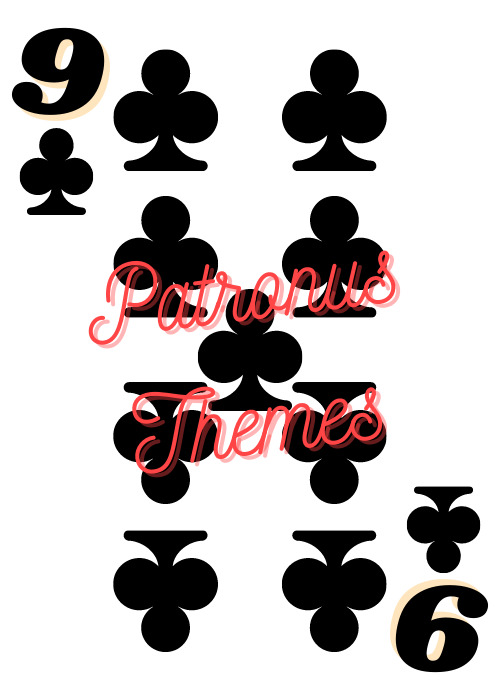
📜 Changing Tides by carpemermaid
Rated: Explicit
Words: 109687
Tags: Bisexual Harry Potter, Alternate Universe - Canon Divergence, Post-Traumatic Stress Disorder - PTSD, Slow Burn, Enemies to Friends to Lovers, Dumbledore's Army, Hogwarts Eighth Year, Auror Harry Potter, Auror Partners, Auror Draco Malfoy, Minor Hermione Granger/Ron Weasley, Patronus, Gardens & Gardening, Cultural References, POV Draco Malfoy, Hogwarts Fifth Year, POV Alternating, POV Harry Potter, Wandless Magic, Coming of Age, Mutual Pining, War AU, Romance, Falling In Love, Humor, Unresolved Sexual Tension, Healing, Post-War, Ministry of Magic, Minor Luna Lovegood/Ginny Weasley, Soulmates, Community: hd_erised, Sexual Fantasy, Wet Dream, Snogging, Frottage, Blow Jobs, Anal Fingering, Masturbation, Mutual Masturbation, Non-Penetrative Sex, Emotional Sex, Hand Jobs, Professor Harry Potter, Person of Color Harry Potter
Summary: Draco has spent half of his life spouting the things his father has taught him without much thought about how he feels about what he says. When he unexpectedly comes face to face with the Dark Lord, he grapples with the harsh realities of the world and struggles with his changing views on life. Instead of doing what’s expected of him fifth year, he joins Dumbledore’s Army and learns how to defend himself, how to make his own choices, and how he can be something greater than his father’s example as he grows into his own man rather than his father’s shadow. The choices he makes change both his and Harry’s fates, intertwining their paths until they converge.
❤️ Read on AO3
📜 Eight Days (to Save the World) by Gnarf
Rated: Mature
Words: 47632
Tags: Post-Hogwarts, Harry Potter Epilogue What Epilogue | EWE, Housemates, Friends to Lovers, Minor Character Death, Mentions of Death, Dementors, Dementor's Kiss, Inferi (Harry Potter), complot, Unforgivable Curses (Harry Potter), Potions, Spells & Enchantments, Auror Harry Potter, Unspeakable Draco Malfoy, Arrests, Duelling, Corrupt System, slytherin friendships, Minor Hermione Granger/Ron Weasley, Order of the Phoenix (Harry Potter), Number Twelve Grimmauld Place, House Elves, Blood and Injury, Scars, Oblivious Harry Potter, patient draco malfoy, Abuse of Authority, Abuse of Auror Authority, Corruption, Law Enforcement Corruption, Ministry of Magic Corruption, Breaking and Entering, Drinking, Drinking to Cope, Lies, Manipulation, Veritaserum, Memory Charm | Obliviate (Harry Potter), Interrogation, Battle, Murder, Supremacist Group Murder of a Black Character followed by Government Cover-Up, H/D Erised 2020, Ministry of Magic (Harry Potter), Case Fic, Conspiracy, safe houses, Minor Seamus Finnigan/Dean Thomas, Love Confessions, Auror Ron Weasley, Patronus Charm (Harry Potter), Friendship
Summary: Darkness returns to the Wizarding World. People disappear without a trace, and all they leave behind are rumours.
When the Aurors are tasked with arresting innocent witches and wizards, Harry once again takes it upon himself to fight against the evil infiltrating the Ministry.
But this time he isn't alone.
And one of his friends is especially determined not to let him die a second time.
❤️ Read on AO3
📜 It's Joggers Season (or so the Muggles say) by carpemermaid
Rated: Explicit
Words: 10160
Tags: Romance, Joggers, Hogwarts Eighth Year, Pining, Falling In Love, Growing Up, Person of Color Harry Potter, Studying, working together, Banter, Patronus, Bets & Wagers, Sharing Clothes, Hung Harry Potter, First Time, Sexual Inexperience, POV Draco Malfoy, Post-War, Redeemed Draco Malfoy, HP: EWE, Wandless Magic, Fluff and Humor
Summary: Everything about Draco’s life since May has been one bloody long exercise in subverting everything he’s known, that’s expected of him, in an effort to get as far away from the mistakes he’s made—the wrong choices he was forced into. He’s returned to Hogwarts to take his N.E.W.T.s and everything is different—namely, Harry Potter strutting around in clingy joggers that Draco can’t get off his mind.
❤️ Read on AO3
📜 The Promise of Summer by Omi_Ohmy
Rated: Mature
Words: 66713
Tags: Post-Second War with Voldemort, Hogwarts Eighth Year, Hogwarts, Minor Hermione Granger/Ron Weasley, Minor Lavender Brown/Parvati Patil, Lack of Appetite Due to Stress, Studying, Exams, fire damage, Post-War Trauma, Scars, Injury, facial injury, Fade to Black, Slow Burn, Fire, Room of Requirement, Healing, Bubble Bath, Bisexual Harry Potter, Self-Discovery, Coming of Age, Coming Out, Friendship, marbles, Toast, Transformation, Tooth-Rotting Fluff, Grief/Mourning, Sexual Identity, H/D Erised 2019, POV Harry Potter, Past Harry Potter/Ginny Weasley, Sentient Hogwarts, Rebuilding Hogwarts, Apologies, Hogwarts Prefects' Bathroom, Transfiguration (Harry Potter), Patronus, Kissing, Frottage, Coming In Pants, Gay Draco Malfoy
Summary: How was Harry supposed to know that coming back for eighth year would be so confusing? Everything is the same, and yet not the same. And nowhere is this more obvious than with Draco Malfoy. Harry finds himself once more watching and following Malfoy, trying to work him out. When they are drawn together to heal the castle, Harry doesn’t just find Malfoy - he also finds himself.
❤️ Read on AO3
📜 Love-Lines crossing by acGranger
Rated: General Audiences
Words: 4573
Tags: Enemies to Lovers, Hogwarts Eighth Year, Divination, Palm Reading, Amortentia, Patronus Charm (Harry Potter), Fluff, Getting Together
Summary: One Divination lesson is all it takes for Harry to become obsessed with Draco Malfoy all over again. When he notices that the Slytherin can’t produce a Patronus, Harry decides to help him, only to keep tabs on him of course.
❤️ Read on AO3
📜 We Are One by orpheous87
Rated: Mature
Words: 80748
Tags: Accidental Bonding, Humor, Fluff, Angst, Auror Harry Potter, Drarropoly: A Drarry Game/Fest, Slow Burn, Bonding, Magical Bond, Pureblood Culture (Harry Potter), POV Alternating, First Kiss, traumatic memories, Complete
Summary: Harry and Draco haven't seen each other for two years, then suddenly they're thrust together in bizarre circumstances. Determined to make the best of a bad situation, they get on with their new way of life. Eventually, they realise that this might not be so bad.
❤️ Read on AO3
📜 Show Me by loveglowsinthedark
Rated: Mature
Words: 7355
Tags: eighth year, Patronus, Getting Together, Awkward Flirting, THEY'RE DORKS, Fluff, Harry Teaches Draco to Cast a Patronus, And like, other cute stuff happens, Gift Fic, background Ginsy
Summary: “We can be friends, if you like,” he says instead, nonchalant and careless.
“What I’d like,” Potter says seriously, “is to kiss you.”
Draco feels his jaw drop, feels the way his hair tumbles into his eyes when he whips around to stare at Potter. “What?” he breathes.
“I think I’d like to kiss you,” Potter repeats sombrely, no hint of mirth evident.
“You think?” Draco says steadily, proud of himself for holding himself together.
Potter’s eyebrows slide up briefly but then Draco can’t think or act or speak or breathe because Potter is leaning in and cupping his cheek gently. “I know,” Potter says simply, and kisses Draco.
❤️ Read on AO3
📜 Expecto Patronum by Magicaltally
Rated: General Audiences
Words: 1432
Tags: Cute, Romance, Fluffy, Like, super fluffy, and cute, maybe? - Freeform, Enemies to Friends to Lovers, Drarry, Oneshot, One Shot, Short, but not really, Love, Sweet, Patronus, Harry is a Little Shit, draco is frustrated, Happy, can be funny at times
Summary: Draco is struggling to find a happy memory to produce a patronus, and Harry steps in to help. -Slash- my attempt at a fluffy oneshot!
❤️ Read on AO3
📜 The Potter-Malfoy School of Patronus Licensing and Identification by AhaMarimbas
Rated: Teen And Up
Words: 1849
Tags: Original Character(s), Patronus, working together, Draco hates his job, Draco also likes to swear
Summary: The Potter-Malfoy School of Patronus Licensing and Identification
Unit 69 B, 303 Diagon Alley
Open Monday to Saturday, 8am to 4pm
Please floo for all queries or to schedule private instruction.
❤️ Read on AO3
📜 Til Death, Never May We Part by carpemermaid
Rated: Mature
Words: 5150
Tags: Angst, Hurt/Comfort, Emotional Hurt/Comfort, Injury, Near Death Experiences, Dementors, Patronus, Romance, Drama, HP: EWE, Post-Hogwarts, Post-War, Angst with a Happy Ending
Summary: This was meant to be their wedding day and here they are, both dying at the hands of Dementors.
❤️ Read on AO3
📜 When I Put My Eyes On You by Zzzara
Rated: Explicit
Words: 31160
Tags: Blindness, Blind Character, Blind Harry Potter, Disability, Physical Disability, Disabled Character, Slow Burn, Falling In Love, Love, Idiots in Love, Love Confessions, Dorks in Love, Friendship/Love, Not Actually Unrequited Love, Requited Unrequited Love, Hogwarts, Hogwarts Eighth Year, Amortentia, Potions, Emotional Hurt/Comfort, Emotional Hurt, Emotions, Emotional, Emotional Roller Coaster, Pining, Pining Harry Potter, Friendship, Friends to Lovers, Developing Friendships, Romantic Friendship, Best Friends, Draco Malfoy & Harry Potter Friendship, POV Harry Potter, Patronus, Spells & Enchantments, Angst, Angst and Hurt/Comfort, Angst and Feels, Angst and Romance, Jealousy, Jealous Harry Potter, Male Friendship, Male-Female Friendship, Spin the Bottle, Halloween, Party, Party Games, Mistletoe, Kissing, Surprise Kissing, Boys Kissing, Rough Kissing, Drunken Kissing, Gentle Kissing, Boys In Love, Drinking, Drunken Shenanigans, Drunkenness, First Time, Explicit Sexual Content, Sex, Gay Sex, Hand Jobs, Emotional Sex, Awkward First Times, Sleeping Together, Literal Sleeping Together, Dancing, Showers, Masturbation in Shower, Sexual Fantasy, Sexual Tension, Unresolved Sexual Tension, Resolved Sexual Tension, Dreams, Fantasizing, Desire, Self-Esteem Issues, Substance Abuse, Angst with a Happy Ending, Happy Ending, Lights Camera Drarry 2020, Lights Camera Drarry, LCDrarry, LCD - Freeform, The Way he looks, film inspired, Self-Prompt, Healing
Summary: When a hero defeats a villain, there's supposed to be a happily-ever-after... but when did anything ever happen to Harry Potter the way it was supposed to? Having sacrificed himself to the greater good, Harry is left alone in the darkness, blindly groping for the shreds of the life he knew. When the enemies meet, how is the story supposed to go, once they learn there's more to it than the eye can see? A story of pain, hope and things we discover, once we stop looking for them with our eyes.
❤️ Read on AO3
16 notes
·
View notes
Note
Thoughts on the Shadow's Doppelganger, Lamont Cranston
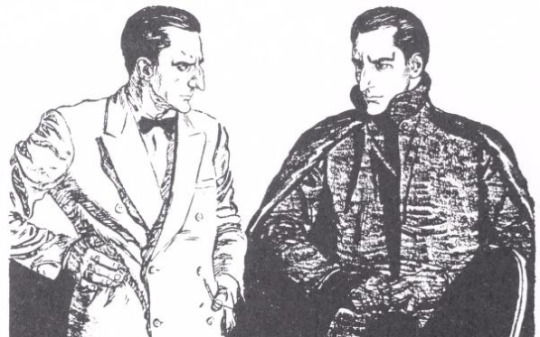
The funny thing about Cranston in the original stories is that, yeah, one of the most famous scenes across all Shadow media is the “Lamont Cranston Talks to Himself” chapter in The Shadow Laughs, where we learn that The Shadow is not Lamont Cranston, but has usurped his identity, and now shows up at his bedside looking like him, talking like him, knowing more about his own life than he himself does, and ordering him to leave town, effectively blackmailing him into letting him use his face. It’s a very iconic scene that exemplifies a lot of what makes The Shadow unique as a character, and you can imagine why so many adaptations have gone with the idea of Cranston being either a hapless stooge bullied into submission, or an actual villain, because that whole scene is very much a horror movie scenario.
Thing is, none of them seem to remember how Cranston and The Shadow’s relationship developed past this. I’ll post this excerpt from Atoms of Death:
"Good morning, Cranston," came a quiet tone from the foot of the bed.
"Good morning, yourself," returned Cranston, rubbing his eyes without noticing the visitor.
"You should say: Good morning, myself," chuckled The Shadow, dryly.
Cranston was pulling down the sleeves of his pajama jacket. He sat bolt upright, staring. Then a slow smile showed on his lips; one that was almost a replica of The Shadow's.
"So it's you," remarked Cranston, sleepily. "Well, I knew that last night. It was about time we crossed paths again. Well, old man, you landed me in for plenty this trip."
Cranston shoved bedclothes aside and perched on the edge of the bed. He found cigarettes on the telephone table; The Shadow supplied a flame from a lighter before Cranston could ignite a match. The millionaire noted that The Shadow's lighter bore the initials "L. C."
"You handle every detail, don't you?" questioned Cranston in admiration. “Jove! I remember the first time I met you. In this very room. You dropped cloak and hat and left me looking at my own face as plainly as if I had seen it in a mirror. Just as it is today."
"And I advised you," recalled The Shadow, in Cranston's own tone, "to take a trip abroad, while I used your identity. You were a bit exasperated at first."
"I must admit that I was. I threatened to have you arrested, as an impostor, until you proved that you knew more about my affairs than I did. I really believe that if it had come to a showdown, I would have been proven the impostor and you the genuine Lamont Cranston. Jove!"
"Jove," repeated The Shadow, quietly, "You have acquired that expression recently, Cranston. I shall remember it for future reference. You have a penchant for acquiring anglicisms during your sojourns in British colonies. Jove!"
"Bounder and blighter," laughed Cranston. "Don't forget those. I still use them occasionally."
Or this excerpt from The Hydra, which is an incredible book where the chemistry between the two really shines:
Lamont Cranston woke up and wondered why his head still whirled. It took him about half a minute to learn that the motion came from the fact he was riding in his limousine. Someone must have put him back in the limousine and Stanley was driving him home.
He didn't have to guess who had helped him on his way, for at that moment Cranston heard a low-toned laugh beside him. He turned to see the black-cloaked figure of The Shadow.
"What did you hit me with?" asked Cranston. "All four of your automatics?"
"I'm only carrying a pair tonight," replied The Shadow
Look at these two dorks, just palling around and getting into shenanigans and The Shadow outright joking around Cranston, like they are just two old chums having a laugh at the weirdness of their lives. The “real” Cranston didn’t show up very often in the original stories, especially in the last stories when Lamont Cranston essentially became the real identity of The Shadow, but when he did, part of what makes him stand out as his own character is that he’s funny. Gibson gets a lot of mileage out of Cranston as this guy who is completely nonchalant and chill about all the weird shit that happens to him, even in The Hydra after he kills a man with an elephant gun, he’s still more or less the same, he largely just walks out of it with a newfound realization.
Relieving Cranston of the elephant gun, The Shadow steered his friend into the closet. Hauling the big weapon with him, The Shadow opened the door to meet and dismiss arriving servants who had dashed upstairs when they felt the house quake.
"Whenever I see this gun," began Cranston, coming from the closet, "I'll remember what I did with it -"
“Quite right," interposed The Shadow approvingly. "What you did to Mance will make amends for any elephants you may have killed. Too bad Mance didn't bring along a few more Hydra Heads.”
Slowly, understanding dawned on Cranston. He'd never compared his big-game hunts with The Shadow's quests for men of crime. He felt that The Shadow's cause was justified, but it had seemed outside the field of sport. It still was, but Cranston, now that he had dealt with a murderer who deserved to die, was realizing that his game hunts were more deserving of rebuke.
His encounters with The Shadow gradually changed Cranston from a useless millionaire wasting his resources and talents on idle pursuits, to...still largely a useless millionaire, except his resources and talents are no longer wasted and he’s gradually grown into a useful ally and friend to The Shadow. The Shadow tends to have that effect on people who work by his side and even Cranston, the guy whose main role in his organization is to just stay away and be useless somewhere else, can’t help but change a little into a better person when he appears.
There’s an interesting article written by Bob Sampson called “The Third Shadow” which refers to the Bruce Elliot run of The Shadow Magazine, which is incredibly maligned by fans and not without reason, the stories all largely suck and the Shadow bears little resemblance to his former self, instead mostly feeling like a diet take on the radio show Lamont, more of an average detective. The theory Sampson puts out is that, during this period, it was actually Lamont Cranston who became active as The Shadow while Allard was busy overseas, and I definitely like this theory. It makes sense specially considering The Hydra sets up for Cranston to become more pro-active and serious:
While not the towering master-mind of Allard, he does become the next best thing: A post-war sleuth. He even indulges in wearing the cloak and slouch hat from time to time (to varying degrees of effectiveness), while trying to laugh like Allard (also to varying degrees of effectiveness) as if to fulfill that forbidden fantasy until he finally gets it out of his system. After all, The Shadow pretended to be him, why not the other way around?
As Bob Sampson put it: “It is always Cranston who explains all and takes the credit”.
Probably very cathartic for Lamont, who for the last 18 years was relegated to being a distant supporting player in his own life. Cranston is still in contact with the agents however. He even receives "assignments" from Burbank.
This entire arrangement could only be with The Shadow's tacit approval. Let us remember, Cranston was not merely some insipid fop. He certainly had done his own share of exploring and was indeed a hunter. He could handle a variety of firearms, was familiar with exotic peoples and their customs, knew how to stalk dangerous animals through the jungle and veldt, but he was not, nor ever claimed to be, a master secret-agent and soldier.
I think it is fitting that the writing is completely different for this period as well. Not the enigmatic journalistic style of Allards exploits, but the witty, modern champagne fizz of Cranston's odyssey in a Post-War world. He feels a full range of emotions. In the Gibson stories, The Shadow is at arms length. In the Elliott stories, Cranston is sitting right next to you on a train or an airplane or roadster.
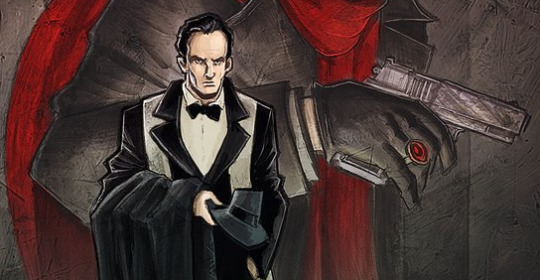
It’s also interesting to consider how Lamont Cranston has basically become the true name of The Shadow in pop culture. Often times it’s the name people use when they specifically want to reference The Shadow, the supposed “Ghost of Gay Street” hauntings in Gibson’s former apartment took the form of Lamont Cranston, and even in the stories, more and more people became aware of it as the years went by (which also helps reinforce the idea that the “real” Cranston eventually took to acting as a fill-in for The Shadow, to draw attention away from the real Shadow’s operations), and Gibson even mentioned a few times that Cranston was The Shadow’s “favorite” identity along with Arnaud. Which is kinda fascinating to think about and does hint at some weird underlying aspects of The Shadow’s psyche, that his favorite identity is one not his own.
And at last, there’s these passages from The Whispering Eyes, a book that does not mention Allard once, and the very last Shadow novel:
From beneath the seat he was taking his black garb. Cloaked and hatted as he stepped from the cab, Cranston merged immediately with the darkness. He had become The Shadow.
Cranston's switch to his other self could well be attributed to a hypnotic mood. The mental lapses produced through hypnosis were the sort that would often cause a subject to revert to habit. Now, as The Shadow, Cranston was still in what might be termed a haphazard mood. He was skirting through darkness, pausing, changing direction, behaving generally as though avoiding something that did not exist.
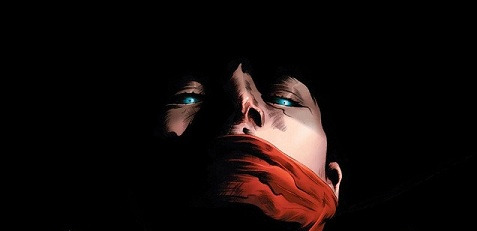
Lang had flung away his glasses; his eyes now showed the shining, hypnotic force that the lenses normally softened. He recognized the eyes that met his above a leveled gun muzzle.
The Shadow's eyes, yet strangely Cranston's, for this was one time The Shadow did not care to disguise them.
Which begs the question: Did Cranston succeed in fully becoming The Shadow? Or did The Shadow succeed in fully becoming Cranston?
22 notes
·
View notes
Video
youtube
This week on Great Albums: a stupendously underrated classic of queer punk meets synth sophistication, and an album without which we wouldn’t have Dare by the Human League: Homosapien, the 1981 solo opus of Buzzcocks frontman Pete Shelley. Find out more by watching the video, or reading the transcript below!
Welcome to Passionate Reply, and welcome to Great Albums! Today, I’ll be talking about one of those albums that isn’t necessarily the most acclaimed or best remembered work of its period, but nonetheless played an important role in history, and remains unrivaled for its uniqueness: Pete Shelley’s Homosapien, first released in 1981.
Shelley has historically been chiefly remembered as the frontman of the punk act, Buzzcocks. But, despite punk’s reputation for simplicity to the point of obnoxiousness, Shelley was one of many musicians to come from the punk scene with a penchant for experimental or otherwise ground-breaking music. His very first solo release, 1980’s Sky Yen, features little more than a brash wall of oscillating electronic noise, not unlike the earliest provocations of industrial artists like Cabaret Voltaire.
Music: “Sky Yen (Part One)”
Subsequent generations of critics have gone great lengths to coin and define terminology, in the hopes of breaking this period down into constituent parts, but the more I study it, the more I’m inclined to view it as just a huge soup. There was, quite simply, a lot going on in Britain’s underground in the late 70s and early 80s, and in practice, the lines between punk, post-punk, industrial, synth, noise, and other avant-garde miscellany are frequently illegible. As an artifact of this era, Homosapien resonates with all of the contradictions this melting pot would imply, fusing emotional rawness and pristine production in a way that never quite settles down and feels comfortable.
Music: “I Don’t Know What It Is”
“I Don’t Know What It Is” served as the opening track of the album’s second side, as well as its lead single. With a bona fide guitar solo as well as a propulsive, and truly soaring, chorus, it somewhat resembles that most 1980s of art forms, the power ballad. It is, ostensibly, a love song, and is revealed to be one quickly enough, but its portrayal of love is far from kind. While a real power ballad might take the concept of love for granted, “I Don’t Know What It Is” seems to portray it as something mysterious, inscrutable, and dangerous. And I can’t forget to mention just how much Pete Shelley stands out as a vocalist--his high-pitched, perhaps even fried or shrill vocals add a great deal to the song’s sense of unease, and really sell the idea of someone who’s being overtaken by an uncontrollable and dominating force.
Of course, perhaps the most noteworthy thing about Homosapien’s sound is its fusion of the hard, driving acoustic guitar of punk with the electronic sensibilities of its producer, Martin Rushent. I wouldn’t say this combination is ever terribly cohesive in its sound, but I think that’s why I find this album so interesting: there’s a tension that permeates each track, a feeling that things don’t fit together. While Homosapien is a pioneering work of electronic-centered production, enough of the pieces are still in place that you can certainly hear the shape of music to come as you listen to it. It’s not just the synthesisers, but also the use of electronic percussion here--it’s difficult to overstate the impact that so-called “drum machines” had around this time. While reviled by many, both then and now, rhythm machines were undeniably “instrumental” in changing what popular music sounded like. Even synthesiser-based electronic acts like Gary Numan, OMD, and Kraftwerk often relied on traditional percussion, so this genuinely was pretty shocking at the time.
Perhaps the most important element of the legacy of Homosapien is the fact that Martin Rushent would go on to use the skills he honed here to produce one of the most influential albums of the 1980s, and perhaps of all time: The Human League’s Dare, which would go on to cast an enormous shadow on nearly all popular music to come, after playing an enormous role in instigating an era of popular dominance of synth-pop. In that sense at least, Homosapien is certainly a very historically important album, and for that reason alone, I think it deserves a fair bit more attention than it gets. Still, for as much as the electronics might be the most forward-looking element of this album, one also can’t deny that it remains full of aggressive and perfectly punk overtones, as on the crass or perhaps dismissive screed of “Guess I Must Have Been In Love With Myself.”
Music: “Guess I Must Have Been In Love With Myself”
While Homosapien has many moments of seemingly being too thorny to get a good grip on, that doesn’t mean that there aren’t also times in which it can feel like a bit more than the sum of its apparent parts, as on its most narrative-driven track, “Pusher Man.”
Music: “Pusher Man”
“Pusher Man” is one of, if not the, most synth-centered compositions to be had on Homosapien, but its insistent pacing and neurotic portrayal of the “low life” theme of buying illicit drugs mean you’ll never confuse it for run of the mill synth-pop. Moreso than anything else the album offers, this track reminds me of the sort of “synth-punk” that American acts like the Units and Crash Course In Science would put forward at around the same time. “Pusher Man” was, at the very least, a sufficiently experimental track to earn the honour of being cut from the US release of the album in order to make room for some non-album A-sides, as happened to many albums at the time. But hey, that’s enough beating around the bush. Let’s talk about the real crown jewel of this album.
Music: “Homosapien”
If you’ve heard anything from this album before, chances are, it was probably the title track, which proved to be quite the commercial success--despite being banned by the BBC on account of its homoerotic content. Given that this very same year, they also came after OMD’s “Enola Gay” for its obviously nonexistent reference to homosexuality, one might be forgiven for thinking that a tune called “Homosapien” was simply misinterpreted. The title track isn’t terribly explicit material, but its clever wordplay nonetheless deals quite deftly with issues of sexuality and personal identity. In the earlier verses, Shelley introduces us to typified roles of gay male sexuality--the “cruiser,” the “shy boy”--only to seemingly doff them with the tune’s defiant refrain, asserting that the only truly important identity a human being has is that of “Homosapien.” Far from being an unfortunate coincidence, the similarity of “Homosapien” to “homosexual” is being employed here completely deliberately, particularly with it being mashed into a single word and thus gaining a greater resemblance to the word “homosexual” in print. It not only allows Shelley to belt out a borderline dirty word, but also creates a sort of unconscious syllogism, suggesting, in a sense, that homosexuals are people too.
With elements of both unapologetic pride in one’s own queerness, as well as the uncompromising assertion that humanity is something much deeper than that, the title track of Homosapien is one of the most fascinating and inspiring queer anthems of its time. Its artsy slipperiness has prevented it from feeling more shallow with time, and its straightforward or raw quality, intensified by that constant acoustic guitar, has kept it sounding equally sharp. It genuinely does surprise me that this album isn’t at least a little bit better remembered than it is. Outside of the title track, most of this album is currently not available on services like Spotify and YouTube Music at the time of this writing, and I actually struggled to present musical examples here. That’s really a pretty high level of neglect in this day and age, and I hope it can be rectified in the relatively near future.
It would be no exaggeration for me to say that Homosapien features some of my very favourite cover art of any album. Homosapien’s sleeve design sees Shelley occupy some sort of sleek, but hollow hyper-modernist office. Geometric forms suggest the world of the artificial or ideal. An Egyptian statue beside Shelley is a reminder of history, and the idea that even the greatest empires must eventually fall. Likewise, the telescope and early computer positioned nearer to Shelley are evocative symbols of science and technology--but in context they seem more sinister, being juxtaposed against a phrenology bust, which evokes the ways in which our attempts at science have caused misunderstanding and great human misery in the past. The central scene is framed in with large areas of black, which make the space feel even more claustrophobic and uninviting, and Shelley appears to be pushed into the background, almost belittled by the inanimate objects. Overall, I think it’s sort of funny that this album’s cover is perhaps more iconally “New Wave” than the music itself ended up being, particularly with Shelley clad in this somewhat foppish white suit and bow tie--certainly a big change of attire for a former punk!
Given the experimental nature of the collaboration between Shelley and Rushent, you might be surprised to learn that Homosapien actually wasn’t a one-off. Just two years later, Shelley would release a follow-up LP, XL-1, which was also produced by Rushent and largely continues the same ideas. While Shelley would never see the success of “Homosapien” again, the XL-1 single “Telephone Operator” would also chart to a lesser degree.
Music: “Telephone Operator”
My favourite track on Homosapien is “Qu’est-ce que c’est que ça,” which closes out the first side of the album. If you’re familiar with my other work, you probably already know that I’m coming at this as someone chiefly interested in the electronic side of things, and I think that of everything on this album, “Qu’est-ce que c’est que ça” is the closest to being convincing as a synth-pop tune. With a bubbly, synth-dominant sound and lyrics that are more contemplative than aggressive, it’s much closer to the mould of what I usually listen to for fun than a lot of the other tracks are. That’s everything for today--thanks for listening!
Music: “Qu’est-ce que c’est que ça”
9 notes
·
View notes
Note
OMGOMGOMG possibly Kakashi head-cannon collection? He is the love of my life (lmao don’t tell my bf that)

Your secrets safe with me he’s my love too😂
Kakashi Headcanons Collection
What He Looks For In A S/O~
• A reader, they don’t have to read Icha Icha (bonus points if you did) but someone who appreciates a good book
• Someone laid back and not very high maintenance
• I see him wanting a shinobi S/O cause he needs them to be to take care of themselves or he’ll worry too much
• he’ll worry anyways
• Someone who understands his pain and won’t shy away from him when he’s going through a rough patch
• Someone who is good with words, like say something sweet and he’s metlinggg
• A person with considerate personality traits
• He would like an S/O who’s willing to try new things and adventures
• Someone who would take things slowly
• Someone who could honestly make him laugh
• He’s DadKashi he’s going to want someone good with kids
• To be frank, he would probably want a relatively stable S/O so that in his mind there’s no chance of them ending up like his father
• He wants companionship so someone who’s not distant and who wouldn’t mind him being around all the time
• I really can’t see him with a tsundere S/O, he needs to see that his partner loves him as much as he loves them
Relationship With Kashi Stuff~
• Please do domestic stuff (Sending him off to work with a kiss, a note in his lunchbox, kissing him when he gets home) he will be near tears every time
• TEAMWORK MAKES THE DREAM WORK™ (whether it’s kicking butt, making dinner, or teaching (raising) Team 7)
• You probably won’t notice moving in with each other until you look up like ‘holy crap I haven’t been to my apartment in like 2 weeks?’
• Read with him or read to him, and you will have his HEART
• He’s not clingy per se, but he loves to be in your presence whenever he can
• Will take you out on dates once a week EVERY WEEK (Sorry Tsunade-sama, I have a date then, but I’ll leave right after?)
• Dating Kakashi means you’re now honorary rivals with Gai (who knows Kashi better, who can make him laugh most etc.)
• Pick up line wars 24/7, the loser has to do the other’s chores Kakashi wins
• Okay, but Kakashi never had a childhood, so make a list of everything he never got to do and you slowly complete them together
• He’s such a sweetheart like, surprise, he’s so sensitive
• Get’s so flustered seeing you in his clothes, he temporarily shuts down
• He’s given up trying to take back his mask whenever you’re wearing it
• Okay, we all know this silver-haired hottie is suave, but he is SMOOTH, he will 100% find ways to have you blush whenever possible, he is the CEO of leaving you hot and bothered
• Made you your own area in the Hokage office as a hint that he needed your company
• Has never forgotten an important date (he uses his Sharingan on the calendar)
• He’s fought demons and other crazy villains, but will still be terrified of you on your period (he’s brave tho he’ll just bring a lot of peace offerings)
• He heard you refer to him as DadKashi in front of Team 7 and/or your friends and just about loses his mind
• When you first see his face without his mask you’re probably pissed cuz WHY would he hide that beauty from the world?! it’s for the greater good hun
How To Lose/Annoy Him~
• Being insensitive/ignorant about things like loss or mental illness
• Constantly distracting him from his duties or hobbies
• Being rude or uncompassionate
• Being willing to abandon people or being self-centered you SCUM
• He always makes time for you, so he’d be a bit bothered if they didn’t put forth any effort to spend time with him
• Little pranks are harmless, but things that make him scared for your wellbeing or stealing his mask are big fat NO
• Being reckless just because, being a shinobi is already dangerous with would you play with death like that??
• Being lazy, Kakashi at his core is really something of a go-go-go person, he doesn’t want to just do anything all the time
Soft Kakashi Things~
• Kakashi is such a softie omg
• He likes to fall asleep last just so he can tell you how much he loves you and you saved him while you’re asleep
• If you’re having a bad day, he’ll drop everything (if possible) to hold you and be there for you in every way you need
• Definitely has Sai draw a small pic of you so he can carry it around and/or put in the Hokage office
• Mission dates are a thing like imagine flirting with Kakashi while destroying your opponents (so romantic)
• He’s big on practical gifts. If he notices you’re running low on shuriken? Expect a box of them from him
• He’ll read a particular *wild* Icha Icha quote to you just to make you flustered (bonus points for him if you’re in public)
• His students question you all the time like how did you end up with their lonely, pervy sensei?
• Will sweep you off your feet for no reason other than he likes to hold you and carry you
Random Kashi Facts~
• Kakashi’s love language is words of affirmation like he craves hearing that you love him and the like
• He hums and sings around the house or whenever he’s bored or preoccupied
• After having eating fish out of necessity day after day he prefers not eating it if possible
• He will often fall asleep a good while after he actually lays down because he enjoys debriefing himself of everything that happened during the day
• Actually sleeps really deep when he’s next to you, otherwise, the smallest sound can wake him up
• He likes to put notes or letters from you in his Icha Icha books so he can read them whenever and no one will peak cuz ew, Icha Icha
• In all honesty, Gai is a common factor in why he’s so late everywhere, but it’s mostly him walking around and taking in the sights like a nostalgic old man
• In the episode where Sakura and Naruto transformed into kids and called Kashi and old man, giving him an identity crisis is actually common. His hair color and the fact that you can’t see his face make some kids think he’s old
• Sometimes when he can’t sleep he’ll find a random tree and fall asleep in it (he’s a strange one)
• He lost his newest Icha Icha book when he was Hokage and very nearly (thanks to Shikamaru) called a citywide search party
Little Things~
Favorite:
• Place to kiss- Your temple, it feels really intimate to him and he’s so tall it’s an easy place for him
• Way to hug- Kakashi loves those giant bear hugs where he just envelopes you like you’re basically one with him now
•’Thing to do with you- He really loves reading with you, whether it’s the same book, or you’re just both sitting next to each other reading
• Type of date- Although your most common date is a mission date (lol), his favorite is being able to take you to a nice restaurant and then on a walk around the city
This or That:
• He’s a winter person actually, he loves being cuddled up with you and blankets, and the abundance of hot drinks
• He’s a morning person because he’s been waking up early since he was a child, and doesn’t really know how to enjoy sleeping anymore (but if that wasn’t the case he’d be a night owl)
• Loves both cooking for you and being cooked for he puts Bobby Flay to shame honestly
• He spends all his time reading obviously and if his S/O is a writer or he’ll be soooo excited and will read everything they put out
Conflict Happenings~
• He knows disagreements are a normal part of relationships (in moderation of course) so if there was a real problem, he wouldn’t shy away from it
• He won’t raise his voice or take a tone with you, he doesn’t feel the need to, but he will definitely get his point across
• To his fault, he might throw in a slight or cutting remark here and there but he will regret it the second your expression changes
• He’s a real go with the flow kind of guy so if he realizes that something is his fault, he will correct it ASAP
• If he notices you’re getting really worked up, he’ll just hug you until you calm down and can speak coherently but at that point it’s like ‘what was I mad about??’
• If his S/O is headstrong it’ll probably bring that side out in him, even if temporarily
• If it’s a minor disagreement he’ll probably say something funny to diffuse the situation
• He would rather die than argue in public, to him it’s a private thing and he hates causing a scene
Modern Kashi~
• I can see him as more of a club/extracurricular activities leader than a teacher
• He’s really close to those kids in his group and probably sheds a few proud DadKashi tears at their graduation
• That one fine teacher that all the students are thirsting over
• If not a teacher he’d probably be an elite CIA agent or a higher ranking FBI officer
• He has so many dogs like he sees a stray and how could he possibly give them up??
• He’d probably walk around Playboy Magazines just cause he can
• At one point he dyed his hair black cause he thought it’d look more ‘normal’ but he HATED it
• He likes plants but he’s so bad at taking care of them?? He can remember all of his dogs’ names and their food preferences but can’t remember to water a plant
• His house is so clean he’s been doing all his household chores since he was a child
• He definitely met Gai in elementary school and they never parted, even going on to become college roommates never again
• Gai probably barges in Kakashi’s classroom so often he’s most likely considered the co-leader/teacher
• Kakashi has definitely gotten drunk on school nights before but he’s such an in-control drunk no one ever noticed
• Kakashi was my first Naruto love and my first husband. BACK OFF
Masterlist
#naruto scenarios#naruto shippuden#kakashi x reader#hatake kakashi#reader insert#Dadkashi#headcanon#hes so perfect
351 notes
·
View notes
Text
I’m curious about “respectability politics” and how it applies to variations on the “born this way“ / “it’s not a choice” argument for toleration of homosexuality.
I’ve heard that “respectability politics” was theorized by Evelyn Brooks Higginbotham in Righteous Discontent: The Women's Movement in the Black Baptist Church 1880-1920, which I have not read yet. (Although this might be a good time to start it, cause I’m just about to finish my current book!) My impression was that it referred to appeals to middle-class norms of respectability as a basis for claims to citizenship and protection and nondiscrimination under the law.
I associate the “it’s not a choice” discourse (and I’m not entirely sure if that’s a bit different from the “born this way” discourse) mostly with a counterargument to conservative Christian pronouncements about homosexuality in the US. I had previously rejected the idea that this argument was a form of “respectability politics,” because I didn’t think that “not being able to choose your sexuality” was a typical marker of middle-class respectable citizenship. I had instead described this argument as “toleration politics,” where, rather than being seen as meeting moral (or citizenship) requirements just as well as everyone else, a special exemption from the standard requirement was being requested based on a (tragic) inability to fulfill it.
But I’m thinking about some things I’ve read and feel like variations of these arguments (which each have their own particularity, but also some commonalities imo) may have more to do with respectability than I originally thought.
But the other part of the equation is that they may involve appeals to religious patriarchal moral authorities. And I’m curious about the relationship between patriarchal religious morality--which I would basically describe like that, although I’m trying to work “religious” out of it--and class and citizenship dynamics. Because it seems like, at least in Christianity (and also in Islam from what I know about it), the acknowledged orthodox sexual morality is patriarchal and doesn’t authorize sex outside heterosexual marriage, even if it overlooks it. (But what variations might I be overlooking because they’re not considered orthodox by more institutionalized authorities?) Is there an automatic link between orthodox patriarchal sexual morality and “middle-class respectability,” just because the former is taken as a basis for the later? In the US, appeals to Christian patriarchal morality are also important to citizenship given the influence of Christian conservatives in politics, but is this also/only about middle-class ideals? (This has all got me thinking about the argument I heard Naomi Goldenberg make on The Religious Studies Project that religions can be understood as vestigial states.) I’m also thinking of religious authority here in terms of patriarchal authority: is this a good way to think about it and how is it incomplete?
Anyway, there are some passages that have been fitting themselves together in my brain:
Karen, editor of Frauenliebe, used sexological concepts of congenital and acquired homosexuality to draw a strict boundary between the two. She argued that anyone seeking same-sex love out of enjoyment of transgression [acquired homosexuality] damaged society and should be "separated from the public." On the other hand, Karen continued, "Same-sex behavior, entered into voluntarily and clearly by both partners [congenital homosexuality], belongs, like every intimate heterosexual behavior, to the realm of things one accepts but does not talk about."[68] Karen also warned aspiring writers to avoid writing explicitly about sexual experience in their stories and essays.[69]
Categorical exclusion shaped a debate in Frauenliebe about bisexuality. Like prostitutes, bisexuals were excluded from homosexual community. Frauenliebe printed fifteen responses to a letter asking readers to express their view on women who had relationships with both sexes.[70] They saw homosexuality as moral and bisexuality as immoral. It was not only movement leaders who wanted to discipline sexual desire in their followers. Letters from readers grouped bisexual women with prostitutes and "sensual" heterosexual women, accusing all of seeking homosexual experiences out of curiosity or sensual desire rather than as an expression of inner character.[71] [...]
Vilification of bisexual women allowed women the opportunity to enter into the classification and definition work of sexology and to create a purified figure of the female homosexual suitable for political citizenship. The "sexual" in homosexual was tamed through strict denial that irresistible desire defined the category. Rejection of prostitutes and bisexuals allowed women to construct "female homosexuality" as materially and sexually pure. As a type, they argued, "true" homosexuals kept desire under the control of the individual will.
-- Marti M Lybeck, Desiring Emancipation: New Women and Homosexuality in Germany, 1890-1933, 2015 Fuller quote here. This one links sexual morality and citizenship most directly and perhaps in the most “respectable” way (the realm of things you don’t talk about).
To understand how MSM is read, it is important to examine how explicit and implicit boundaries are drawn around the category gay. Consider, for example, a passage from Paul Farmer in which he claims that, in recent years, there have been fewer HIV cases than predicted among gay men in the United States, a category he implicitly racializes as White via the contrast with “injection drug users, inner-city people of color, and persons originally from poor countries in sub-Saharan Africa or the Caribbean.”21(p47) He further excludes gay from poor and suggests that “males involved in prostitution are almost universally poor, and it may be their poverty, rather than their sexual preference, that puts them at risk of HIV infection. Many men involved in homosexual prostitution, particularly minority adolescents, do not necessarily identify as gay.”21(p47) With this juxtaposition, Farmer seems to suggest that same-gender behavior among poor men of color (especially youth) is sex work rather than sex for pleasure and is devoid of identity and community; same-gender behavior among White men is read as synonymous with gay identity.
Compare these assumptions with a recent ethnographic report on men at risk for HIV in Dakar, Senegal.22 While many of these “men who have sex with men” are poor and engage in sex work, the authors found that they have indigenous sexual-minority identities that are differentiated and socially meaningful. Senegalese sexual-minority identities serve as a basis for social organization, including, but not limited to, sexual roles. The authors describe ibbi as men who “tend to adopt feminine mannerism[s] and to be less dominant in sexual interactions,”22(p505) whereas yoos are men who “are generally the insertive partner.” They also stress that the categories have “more to do with social identity and status than with sexual practices.”22(p506) [...]
Is MSM a useful term for describing groups that eschew prominent LGB categories? Much has been made of the fact that men on the DL lead secret lives and do not consider themselves gay.25,26 But DL is not a behavioral category that can be conveyed as MSM. As Frank Leon Roberts has put it, “DL is . . . about performing a new identity and embracing a hip-hop sensibility [italics added].”27DL functions not as a nonidentity but as an alternative sexual identity and community denoting same-gender interest, masculine gender roles distinct from the feminized sissy or faggot, Black racial/ethnic identity, and a dissociation from both White and Black middle-class gay cultures.26–28
-- “The Trouble With “MSM” and “WSW”: Erasure of the Sexual-Minority Person in Public Health Discourse,“ by Rebecca M Young and Ilan H Meyer, published in American Journal of Public Health, July 2005. This one doesn’t deal with the “it’s not a choice" argument directly, but suggests who people might want to exclude and have actually excluded in practice from categories of “sexual orientation" and “born this way” gay identity.
Omar’s analysis of linguistic terms has direct impact upon the issue of interpretation of the Qur’an. This analysis, published in 1997, predated the El-Moumni Affair by four years, yet illustrates exactly the conflation of terms which the imam pronounced in that controversial interview. Omar writes, “Many words are used to express sexual relationships that take place between man-and-man or between woman-and-woman. . . . Whether in modern standard Arabic or local dialects, there are terms like sexual deviance (al-shudhudh al-jinsiyya) and sodomy (al-liwat) and also homosexuality (al-junusiyya). . . . The problem is that most people use these different terms as synonyms, creating a situation of naming experiences with names that do not really fit, thereby generating misunderstanding and confusion about the topic of sexual orientation. . . . I see the critical importance of writing about homosexuality as the attempt to remove these confusing mix-ups of terms and issues.”[15] In this crucial passage, Omar explains that his project is to differentiate between homosexuality and sodomy. In his understanding, the Qur’an condemns sodomy as the act of anal penetration rather than homosexuality as sexual orientation, while the Islamic legal tradition mistakenly conflates the two.[16]
The distinction between homosexuality and sodomy makes sense if one asserts that there is a psychological reality called sexual orientation, which is separate from and prior to any sexual act. He writes, “Sex is a phenomenon that happens by way of the body, whereas sexuality is a matter existing at the level of psyche and personality.”[17] In his analysis, only a person with a psychological identity of constant and exclusive same-sex desire should be called “homosexual” (junusi in his terminology, or mithli jinsiyya in the Arabic terminology of other contemporary writers). The person who performs same-sex acts without doing so within the framework of exclusively homosexual orientation can be described as sodomite (luti). It is this behavior that characterizes the Tribe of Lot, who wanted to perform same-sex acts for reasons other than as a genuine expression of their sexual identity and psychological persona.[18] Omar’s analysis challenges classical Islamic law. Jurists instituted practical norms forbidding same-sex acts such as sodomy (liwat), with the assumption that those performing them were, in their inmost character, actually heterosexual (or at least functionally bisexual).
--Living Out Islam: Voices of Gay, Lesbian, and Transgender Muslims, by Scott Siraj al-Haqq Kugle, 2014. I read this one yesterday. I can’t be sure whether bisexual people are considered at all, even as a footnote, in Omar’s analysis, and if they are, whether their pursuit of same-gender sex would be categorized with the acceptable homosexuals or unacceptable heterosexuals. I’m not sure here if Omar has in mind for sodomy rape specifically, or any anal penetration, or sexual activity (anal or not) between men that’s perceived as ‘voluntary’ rather than following the demands of exclusive sexual orientation.
But I think it’s interesting how intent/context/constraint of orientation is factored into ethical analysis here and in the first quote, in a way that accepts some forms of or reasons for having same-gender sex as unethical or socially disruptive. And in the first quote, these ‘voluntary’ expressions are imagined to be rooted in hypersexuality and sex work, distinctly un-middle-class. The last quote is engaging with Islamic legal traditions as well as theology, and I don’t know much about how this articulates with “citizenship,” although the author was writing in the Netherlands where LGBT rights were guaranteed by secular authorities.
Anyway, that’s what was bouncing around my head last night.
42 notes
·
View notes
Text
Marvel’s Spider-Man: Miles Morales story and character review
So let’s state a disclaimer, I didn’t like the PS4 Miles character as it was blatantly clear that they never read a Miles story with the actual mistakes they made(Miles going to the wrong school, Rio being a science teacher, Jefferson loving vigilantes/supers, using MJ as an origin for Miles, the skin lightening of both Miles and Rio). It was insulting because they clearly researched and had a fidelity to Peter Parker as they had references from both of the 616 and Ultimate Universes but with Miles, they somehow missed the first thing about Miles: he doesn’t want to be Spider-Man. I didn’t like this version. Notice the past tense.
Miles Morales PS5 redeemed him. I am half-way as I’ve done all of the side quests and pretty much half of the main story. And I also seen the whole main story on YouTube. So yeah.
First off, the first thing I noticed about Miles was his fresh-cut. It was, to quote my brother, “a hot mess” in the first game. I was delighted to hear that the first thing the “black” consultant told the Insomniac developers. His edge was fucked up. Second thing was how social Miles was. Third thing is that they retconned Miles going to Midtown. Yes, in the first thing they did actually have kid in Brooklyn attend a public school in Queens. I am pretty sure in the remaster the changed it to Brooklyn Visions.
These changes along with the fidelity of the relationship between Miles and Ganke were what sold me on this version of the character. I get it. No one wants Peter to die and honestly, they probably should have just used Anya, but Miles is popular now and it’d be stupid to just not capitalize.
So let’s talk about a few characters starting with the actual main character of the game: The Tinkerer.

Let me tell you that at first I thought she was redundant. I am not going to spoil it, but it was obvious the moment she is introduced in the game and Miles mentioned her twice before she is formally introduced. It’s clear that she was the focus. I felt that she was redundant because there is a literal harem of morally dubious women who Miles has a close connection to that she takes aspects from. Tinkerer is an amalgamation of all of them. She is a girl leading a gang(Diamondback/Tomoe) who is a genius inventor(Ceres). She wants revenge against a company that is poisoning the city and killed her brother so she becomes a ruthless vigilante(Tiana). Her powers or devices are that she manipulates a metal to form any shape she wants(Tomoe). Her relationship of Miles is one that is really platonic with some romantic undertones(literally every single person that I mentioned) but it is torn apart because Miles lies and keeps secrets from her(Katie Bishop).
What sold me on her character is the work they did in her collectibles which I implore you to collect because they provide so much depth to her character and also, it doesn’t really bother to explain Miles’ character in this world but hers. This girl is hurt because her loved one was killed and she saw Miles as family or a second brother. They hung out together and as soon as Miles went to Visions, they drifted apart. I’ve always wondered about the kids Miles left in his whole transfer situation and Tinkerer was one of them. Her pathos and identity is very much tied to Miles. And I love her.
Look, at first, I was reluctant to want her in the main comic, but someone put in too much work to not include her in Miles’ main rogues gallery. I hope that Saladin sees it and implements a version of her in the MM: Spider-Man comic. She also reminds me of Gear from Static Shock except she is not a gay white man.
Ganke was spot on. This is the best adaptation of Ganke I’ve seen.
Yes even better than Homecoming.
Ganke is part of Miles’ Spider-Man. He is not just the fat Asian kid providing tech support. He is the motivation and is apart of it too unlike the thing they tried to do with MJ and Peter in the first game. This also shows the clear contrast of Peter and Miles. Peter never trusted anyone enough to be that involved in his being of Spider-Man. Miles knows that he can’t do it alone and relies on Ganke for information gathering and webs. Ganke is important and this game nailed it.
Aaron Davis is in this game and no one is surprised. This version of Aaron...is different. Okay in the comics, he is a foil to Miles in that while Miles is becoming more heroic, Aaron is becoming more villainous. It’s no coincidence that Spider-Man and the Prowler look similar but the gist is that if Miles didn’t get bit by the spider, Miles would have become Prowler 2.0. The game eschews this dynamic because it is hard to pull that off after the mangled Miles’ origin so they opted for the Prowler to foil Miles in a different way: keeping secrets from family and friends and being protective of family because fear of loss. Aaron, after losing his brother and never getting a chance to reconcile with him, is hurt and wants to protect Miles and subsequently Rio. Miles, throughout the game, is becoming increasingly worried about his mom running for city council and painting a target on his back. He shows his frustration and distances himself from his mother in his work as Spider-Man. Aaron does the same to Miles when he finds out that he Spider-Man. There comes a point where the two collide and Aaron goes further into the extreme which I won’t spoil. You get it.
This change, while different, isn’t terrible. It’s actually really well thought out. It accomplishes the same thing in that Aaron is not a good role model but he is a good person to Miles. It allows Miles to reflect on his own behavior towards his mother. So I’m with it.
Oh and before I forget, Danika being in this game sold me that they actually started actually researching Miles. They ignored the weird racial commentary that she became enamores and she became a foil to JJJ. A voice of youthful and helpful positivity vs Randian cynicism and skepticism. A social justice activist vs an arrogant self important commentator. And it was fun listening to her. Hopefully Saladin brings her back. I am currently on Underground base liberation missions where she teams up with Ganke and Miles in putting them down. Just started, but there was already some mild hint that Ganke is crushing on her(they are a couple in the comics). So yeah.
The cons because like Ganke, I love pros and cons list. Two things about this game annoys me. First, the move to Harlem and this forced narrative of Miles being Harlem’s Spider-Man made no sense because just look at the map. Harlem is part of Manhattan. There is nothing stopping Peter from visiting Harlem regularly. Brooklyn, however, would justify having their own Spider-Man. As, if you didn’t know, Brooklyn is emerging into becoming the next big city as the area is thriving. Also, gentrification. Point is there is a reason why Miles connection to Brooklyn is important. It is foil to Peter who is from Queens and wanted to move into Manhattan island because part of it was he saw it as a measure of success to get out of the old neighborhood and make it big. Miles loves Brooklyn and doesn’t want to move out. Trying to replicate his love for his city in Harlem just because it’s predominantly black and brown is lazy and honestly if they included Brooklyn in the game, it would have justified the price of this game. Which brings me to the second point.
This game is too short on content to be costing $50 dollars. Just to point out something, all of the DLC from the first game cost 10 bucks a pop and you had as much content in those three expansions as you do this game. Infamous First Light was the same exact thing in relation to Infamous Second Sons and it cost 30 bucks. Uncharted Lost Legacy cost 30 dollars. I could go on. Point is that it shouldn’t have costed nearly the price of a full game when in comparison to the previous iteration, it wasn’t. Now I’ve seen people say that hating because it’s short isn’t warranted or pull up this quoted fact that video games are too long. Anti-consumerist bullshit aside, the difference between the main storyline of the previous game and this one is not repetition. It’s the lack of variety in enemies and deesculating storylines. In the first game, there were a variety of enemies that had their own AI and attacks. And you adjusted accordingly to whom you were facing. There were classes of enemies within the variety. You had the rudimentary common criminal which had 4 classes and how to deal with them and from that point, each enemy afterwards were variations of those four classes and each provided a different challenge. The repetition wasn’t boring because it provided a new challenge. This game only gives you three types of enemies and while 2 are vastly different from anything in the previous game or it’s expansions, the need to limit the series to focus on narrative becomes unwarranted because you are still getting less for nearly the same price.
That’s all. Have a great day. It was a fun game. Really.
@ubernegro
35 notes
·
View notes